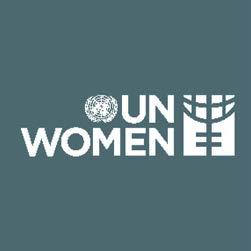ACTIVITY REPORT 2024

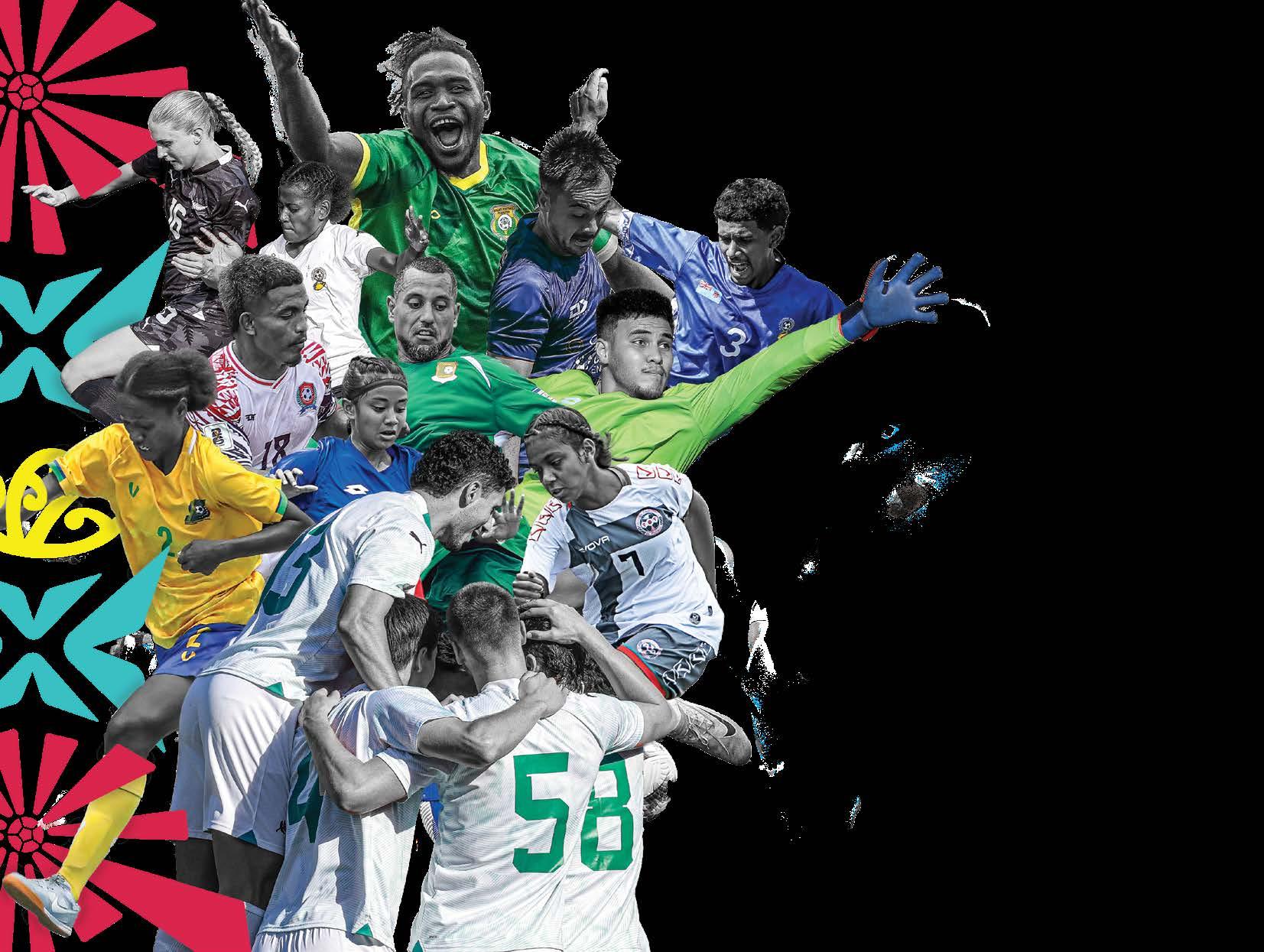


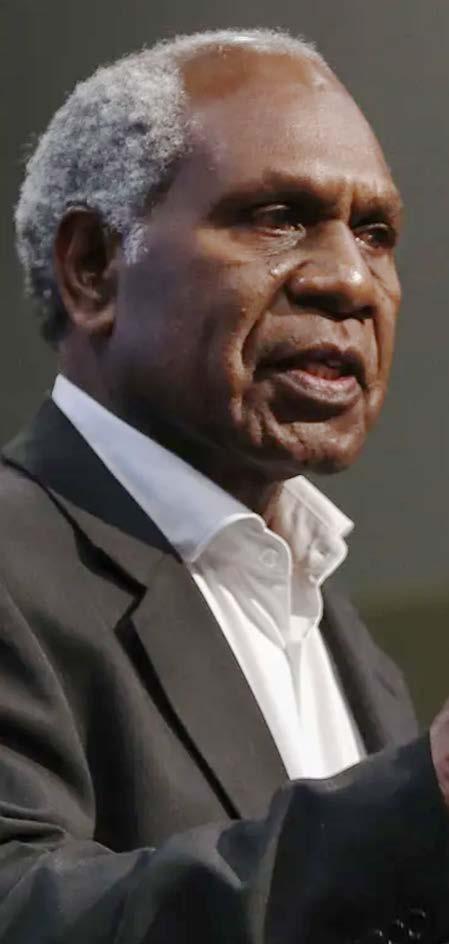






As we reflect on 2024, I am proud of the progress and milestones we have achieved together. This year has been pivotal for the Oceania Football Confederation as we continued to lay the foundation for sustainable growth, development, and impact in our region.
A major focus of 2024 was the groundwork for the OFC Professional League, which is set to launch in January 2026. Our efforts this year have centered on developing the league framework, engaging stakeholders, and aligning with clubs to create a platform that will elevate football across Oceania. This initiative aims to provide an aspirational environment for players and clubs while enhancing the overall standard of competition.
Competitions played a vital role in 2024, serving as a platform to highlight the talent and passion of our region. The OFC Champions League both Men’s and Women’s brought together the best club teams across Oceania, delivering thrilling matches and a high level of competition. The OFC Men’s Nations Cup also returned, providing national teams with an opportunity to compete at the highest level while uniting fans across the region. And just as significantly the kick off the FIFA World Cup 2026 Oceania Qualifiers in Samoa, Fiji, Vanuatu, Papua New Guinea and New Zealand. OFC
hosted a total of 20 events including the U-15 Girl’s Development Tournament and 11 Competitions stamping our commitment to developing and growing the game. FIFA allocating 1.5 qualification spots to OFC for the FIFA World Cup in 2026 for the first time in history was a landmark achievement that underscores the growing competitiveness of football in Oceania, and our collective ambition to excel on the world stage. This decision paves the way for greater opportunities for our players and Member Associations and highlights the confidence FIFA places in the progress we are making as a region.
We intensified our commitment to nurturing young talent. Through our academies and grassroots programmes, we engaged over 70,000 young players, with a focus on inclusion and gender equality. These initiatives have not only produced promising talents but have also fostered a love for the game among Oceania’s youth.
2024 was a landmark year for women’s football in Oceania. Participation in grassroots programmes grew significantly and in New Zealand particularly by 27%. The introduction of new coaching clinics and leadership programmes for women has further strengthened our commitment to gender equality in football.
Critical infrastructure projects led by FIFA across the region progressed significantly in 2024. New training facilities and stadiums in key Member Associations (MAs), including Samoa, have been instrumental in supporting grassroots and elite football development. These projects reflect our joint dedication to creating an enabling environment for football at all levels.
Through our social responsibility programmes, we positively impacted over 15,000 lives this year. Initiatives such as “This is How We Football” addressed key issues, including education, health, and gender equality, demonstrating the power of football as a catalyst for positive change in our communities.
Looking ahead, my vision for 2025 is anchored in three priorities. First, we will focus on development and education with our Member Associations to improve professional management and administration across the region. Second, we remain committed to high performance, with the OFC Professional League as the cornerstone for elevating the competitive standards of football in Oceania. Finally, we will continue to emphasise good governance, ensuring that our operations are transparent, ethical, and aligned with global best practices. These priorities will guide our efforts as we strive to build a stronger foundation for football in our region.
I would like to extend my sincere gratitude to FIFA and all of OFC’s partners: the New Zealand and Australian Governments, UEFA Together, UEFA Foundation for Children, UNICEF, UN Women, Laureus Sport for Good, Football Australia, Unilever and Score Sportswear Limited (Lotto). Your confidence and support have been instrumental in our achievements, and we value the trust you place in us as we work to grow the game in Oceania.
Our progress this year is the result of the hard work and dedication of our players, coaches, officials, and the invaluable support of our Member Associations and partners. Your commitment has been integral to our shared success, and I extend my heartfelt gratitude to each of you.
Let us move forward together, united by our passion for football and a shared vision for a brighter future for the beautiful game in Oceania.
Yours in football,
Lambert Maltock OFC President

As we close the chapter on 2024, I am proud to highlight the significant strides we have made under the three strategic pillars of Education, Development, and High Performance. These pillars form the foundation of the Oceania Football Confederation’s mission, driving our commitment to empowering Member Associations (MAs), elevating the game, and inspiring communities across Oceania.
Education took center stage in 2024 with the continued success of the OFC Executive Programme. This initiative brought together Member Association CEOs and senior leaders to enhance their skills in critical areas such as highperformance management, leadership, communications, digital marketing, and club licensing. The latest session, held in Fiji, emphasised leadership and communication strategies, equipping participants with the tools needed to navigate the challenges of modern football administration. By fostering professional growth and encouraging the exchange of ideas, the OFC Executive Programme is setting a new standard for effective management across the region. These efforts reflect our unwavering commitment to building strong leadership and professional governance within our Member Associations.
OFC and UEFA launched a groundbreaking three-year partnership at a workshop in Düsseldorf, Germany, held alongside UEFA EURO 2024. As part of the collaboration, we will work together to improve football management within the OFC’s capacity-building programmes, as well as football development through OFC U-15 tournaments. In Development, we continued to increase participation at all levels and enhance pathways for players, coaches, and officials. Grassroots programmes engaged thousands of children and youth, fostering a love for the game while promoting inclusivity and gender equity. These initiatives are a testament to our commitment to providing highquality environments for players to learn, grow, and excel.
A four year landmark agreement was signed with the French Football Federation (FFF) which will encourage and facilitate an ongoing working relationship that will involve valuable knowledge exchange, and provide resources in vital areas such as Development, Administration, Competitions, Coaching, Refereeing Education, Sport Medicine, Technology and Social Responsibility.
High Performance has been a defining pillar in 2024, with several remarkable achievements that highlight our commitment to raising the standard of football in Oceania. Preparations for the OFC Professional League took significant strides, as we laid the groundwork for this aspirational competition. This league represents a transformative opportunity for the region, offering a professional platform that will attract top talent and inspire the next generation of players. Key milestones included opening discussions with stakeholders in Australia, signaling the league’s potential to broaden its impact and appeal.
Additionally, we secured a partnership with consumer giant Unilever, under its Rexona brand, as a sponsor for the FIFA World Cup 2026™ Oceania Qualifiers. This partnership underscored the growing recognition of OFC competitions and brought vital resources to support high-performance initiatives. Furthermore, our collaboration with FIFA+ as the official livestreaming and media rights partner elevated the visibility of our competitions and enhanced fan engagement on a global scale. These partnerships contributed to a remarkable 34% increase in commercial revenue in 2024, far exceeding our initial target of 15%, and reinforced the financial sustainability of our high-performance programmes. As we look to 2025, these strategic pillars will continue to guide our efforts. We are committed to deepening our impact in education through innovative programmes, driving development by expanding participation and inclusivity, and advancing high performance by solidifying the foundations of the OFC Professional League and preparing our football community to excel at the highest level.
I extend my deepest gratitude to our Member Associations, partners, and stakeholders for your unwavering support, trust, and collaboration. Together, we are creating a legacy that will inspire future generations and highlight the extraordinary potential of football in Oceania.
Yours sincerely,
Franck Castillo OFC General Secretary

Chief of Football’s Report
Football Development
Women’s Football
Player Development
Goalkeeping
Futsal
Beach Soccer
Clubs and Leagues
Education
High Performance
Refereeing
Social Responsibility

Patrick Jacquemet
OFC Chief of Football
2024 was a year of transformative progress for football in Oceania, driven by our commitment to the strategic pillars of Education, Development, and High Performance. This year has seen the Football Division achieve key milestones, elevating the game on and off the pitch while reinforcing our mission to empower Member Associations (MAs) and inspire communities across the Pacific.
Education remained at the heart of our efforts. The introduction of innovative learning tools, such as the OFC Learn platform, saw record participation, with over 10,500 users embracing new opportunities for growth. Milestones in coach education, including the region’s first OFC and New Zealand (NZF) Pro Licence diploma and an increased focus on women’s coaching, further underscored our commitment to developing the game’s leaders.
Development reached new heights in 2024, with Member Associations delivering groundbreaking initiatives to expand football’s reach and impact. Highlights included the inaugural Talent Development Inter-District Championship in Fiji, Vanuatu’s first local Coach Educators course, and youth coaching programmes across Tonga, Samoa, Cook Islands, and American Samoa. International exposure through youth tours and workshops, alongside an expanded Club Development framework, ensured the next generation of players and administrators are well-equipped to drive football’s future.
In High Performance, OFC celebrated one of its most historic achievements: the allocation of 1.5 qualification spots for the FIFA World Cup. For the first time, Oceania has a direct pathway for multiple teams to compete on football’s biggest stage. This milestone reflects the increasing competitiveness of football in the region and provides a powerful incentive for Member Associations to elevate their development and high-performance programmes.
The allocation of 1.5 spots not only acknowledges Oceania’s progress but also establishes a clear goal for players, coaches, and administrators to work toward driving innovation and excellence across the region.
OFC also strengthened its competitive framework while achieving significant milestones. Regional goalkeeping programmes and the debut of Papua New Guinea in the OFC Beach Soccer Men’s Nations Cup highlighted the strategic expansion of specialised disciplines. With 127 senior national team matches played in tournaments and friendlies in 2024 and enhanced collaboration with Football Australia through the PacificAus Sports programme, our teams are increasingly competing at the highest levels.
A standout achievement this year was in women’s football, reflecting our commitment to gender equity and empowerment. The inaugural OFC Women’s Futsal Nations Cup saw New Zealand triumph and secured their place in the first-ever FIFA Futsal Women’s World Cup, highlighting the growing depth and competitiveness of women’s futsal in the region. The OFC Women’s Football Conference, brought together football leaders, coaches, and administrators to discuss strategies for advancing the women’s game. This event emphasised innovation, inclusivity, and the need to create pathways for women across all levels of football, setting the tone for future growth.
A landmark moment for women’s football came with Samoa’s U-16 women’s team qualifying for their first FIFA tournament, earning a spot in the FIFA U-17 Women’s World Cup. This historic achievement highlights the potential for Oceania to compete at the highest levels while inspiring the next generation of female athletes. Additionally, coaching programmes, such as the OFC Women’sOnly Senior C Licence course, broke new ground in countries like Vanuatu, ensuring women’s representation in football education and leadership continues to grow.
As we look toward 2025, our focus remains on building sustainable pathways for talent, fostering inclusivity, and ensuring Oceania continues to make its mark on the global stage. The 1.5 FIFA World Cup spots represent a new era for football in the Pacific, and we are committed to ensuring our Member Associations are prepared to seize this opportunity and continue inspiring future generations.
Yours in football,
Following on from a successful year of women’s football in 2023 which featured the FIFA Women’s World Cup, 2024 saw significant steps in fulfilling the All In Women’s Football Strategy of increasing the development, growth, sustainability, and professionalisation of women’s football in the Oceania region.
On the field, Women’s Football saw increased numbers in participation across the region, with New Zealand Football leading the way with an incredible 27% growth in girl’s and women’s football. This growth has highlighted a need for more girl’s and women’s leagues/competitions locally in Member Associations (MAs) and in turn, had a positive effect on the OFC Women’s Champions League held in the Solomon Islands, with eight Member Associations represented in 2024 – Three more than in 2023.
The Women’s Futsal Nations Cup also took place in the Solomon Islands in 2024. This was the inaugural tournament with one qualifying spot available for the FIFA Women’s Futsal World Cup. After a close tournament between five nations, New Zealand was victorious qualifying for the FIFA Women’s Futsal World Cup in the Philippines in 2025.
In 2023 FIFA announced the increase in qualification spots available for the FIFA Women’s U-17 and U-20 World Cups for Oceania. The impact of this has been positive with more Member Associations priortising their youth women’s football players and new nations featuring on the world stage.
With this increase, Fiji competed alongside New Zealand for the first time at the FIFA U-20 Women’s World Cup in Columbia and Samoa made history qualifying for their first-ever World Cup (Men or Women) by qualifying for the FIFA Women’s U-17 World Cup to be held in Morocco in 2025. New Zealand will join them as the first qualifying nation.
Following this announcement, more support and development is being provided to Member Associations to further grow the player pool along with educating and empowering girls and women through football. The ‘This Is How We Football’ (THWIF) Programme made significant progress in providing opportunities to girls aged 13-18 years with eight Member Associations and one Associate Member delivering the programme which was piloted in 2023 to four Member Associations.
Off the field, Women’s Football and Social Responsibility collaborated to deliver the OFC Women’s Football Conference in Wellington, New Zealand. This fourday conference saw 40 representatives from our 11 Member Associations come together to discuss the future of women’s football and work together to provide opportunities for more girls and women to be part of our game both on the field and off. Participants were also joined by a special guest – FIFA Chief Women’s Football Officer Sarai Bareman.
Capacity Building remains a priority for Women’s Football with all Member Associations continuing to develop women off the field to ensure a positive impact on the next generation of players and administrators. Following on from a successful 2023 where the programme received numerous awards, the OFC Women’s Football Capacity Building Programme in partnership with The Capability Group, was once again awarded the Platinum Award for the Best Learning & Talent Development category for Leadership Development at the 2024 LearnX Awards.

2024 saw the celebrations of key milestones, creative initiatives, and programmes in player development across various Member Associations (MAs), helping to elevate and strengthen football across the Pacific.
The inaugural Talent Development Inter-District Championship (IDC), organised by the Fiji Football Association (FFA), was launched in September. Held in Suva, the event had over 450 children from across the country attend, from as young as 9 to 15, across both boys’ and girls’ divisions. It provided a pivotal space to nurture young talent across Fiji and create a clear pathway to youth academies and national teams.
In a groundbreaking achievement for Vanuatu, they hosted their first ever local Coach Educators (CE) course. 12 coaches were represented from all eight member associations of Vanuatu Football Federation (Torba FA, Sanma FA, Malampa FA, Shefa FA, Tafea FA, Luganville FA & Port Vila FA), with four coaches identified as potential candidates for OFC Coach Educators courses in the future.
It coincided with the Port Villa U-16 boy’s trials, with six boys out of 35 referred to the Vanuatu Football Federation (VFF) U-16 national team trials by OFC. It highlights the effort VFF is making to improve grassroots coach education to lift the national youth level standard. Aligning with the broader initiative
to strengthen grassroots coaching, contributing to the 317 Youth Development Training Centers established across 11 MAs.
In 2024, the number of Grassroots Development and Skills Centers across the 11 MAs rose by 46 regularly involving 58,261 6–12-year-old players.
An exciting OFC Unity Football Festival took place in Auckland centered around the OFC U-16 Women’s Championship – Qualifying tournament. The project was a collaboration between internal OFC departments and external school agencies –aimed at getting children active through football, broadening their local community perspective and showing them there is more to life outside of their current settings. 169 students from Otahuhu Primary School and Mount Roskill Intermediate attended the festival series. This was part of a wider grassroots effort reflected in 125 grassroots leagues and 95 grassroots festivals being held across Oceania, engaging thousands of young players.
Youth coaching programmes were delivered across Tonga, Samoa, Cook Islands and American Samoa with a big focus on helping certify local coaches and improve the level of youth coaching in the region. These efforts contributed to the 6,340 boys and girls engaged in Youth Development Programmes and the 29 Player Development Officers now working across the region. 11 participants from
Tonga received their Youth Football coaching course certificate, with 12 participants receiving their Cook Islands Football Association (CIFA) Youth Football Coaching and OFC Introduction to Player Development certificates. It was Football Federation American Samoa’s (FFAS) first Player Development workshop in six years, giving coaches an invaluable opportunity to grow their knowledge and elevate their practices.
International exposure was provided through youth tours and workshops, with Tahitian side AS Tefana FC sending their U-13 boys team to Auckland for a development tour. They went up against Papakura FC and one of Auckland’s top clubs, Eastern Suburbs, giving players and staff exposure to a different football environment.
Heading into 2025 Player Development is focused on the re-launch of the Stars of Tomorrow initiative aimed at inspiring, developing and rewarding young players through incentivized programmes. Member Association visits to Fiji, Papua New Guinea, Tahiti, Samoa, Cook Islands and Vanuatu to deliver Player Development workshops and Youth Coaching courses. While working to create a Player Development Officer Diploma, designed to equip participants with the skills and knowledge to develop football players effectively at various stages of their growth.

Significant steps were made in 2024 in elevating the region’s goalkeeping standards with the successful completion of the inaugural OFC and New Zealand Football (NZF) Goalkeeping B Licence course. Delivered in two phases—April and October in Auckland—the programme saw 12 dedicated coaches from across New Zealand sharpen their expertise. Among them, Southern United Women’s Assistant and Goalkeeping Coach Tom Stevens made history as the first-ever OFC and New Zealand Football (NZF) Goalkeeping B Licence-qualified coach, passing his final assessment with flying colours.
The momentum continued with the rollout of the first of three OFC Goalkeeping C Licence courses in 2024, kicking off in Napier. This course was notable for its diverse participation, including four female attendees and former All Whites goalkeeper Michael Woud. In July, the programme expanded to the Solomon Islands, marking a historic milestone as the country hosted its first-ever OFC Goalkeeping C Licence course. A total of 17 candidates took part, with nine hailing from the Solomon Islands and eight representing various OFC Member Associations (MAs)—two from Samoa notably National team Goalkeepers Joseph Kapisi and Ronisa Lipi, three from Fiji, two from Vanuatu, and one from the Cook Islands.
The final Goalkeeping C Licence course of the year saw a groundbreaking moment: three female goalkeeping coaches – Danja Jamieson, Amber McConnochie and Hannah Halpin- under the age of 22 took part, a promising sign of progress in a field traditionally
dominated by men. Their presence underscored the growing potential of women’s goalkeeping in New Zealand and Oceania.
Looking ahead to 2025, OFC and NZF are set to build on this momentum, planning an OFC Regional Goalkeeping C Licence and two additional Goalkeeping C Licence courses in collaboration with NZF. A key focus will be recruiting and developing more female goalkeeping coaches, ensuring greater representation and growth in this space.
In another landmark achievement, former Tongan international Mausia Patolo became the first woman outside of New Zealand to earn the OFC Goalkeeping C Licence. Having started her journey in 2022 through an OFC and NZF initiative, she officially qualified in February this year. Her success means the Tonga Football Association (TFA) now boasts two OFC Goalkeeping C Licence holders, a significant step for the nation’s football development.
OFC also strengthened its goalkeeping infrastructure by Member Associations (MAs) appointing key personnel across the region. At the start of the year, Papua New Guinea’s Godfrey Baniau was confirmed as Goalkeeping Development Officer, while Cook Islands named Tyson Tekeu to the same role— demonstrating commitment from both the largest and smallest Member Associations in Oceania. Meanwhile, in Vanuatu, OFC played an active role in advancing goalkeeping education, with a new development programme for premier and division one goalkeepers.
OFC further supported Vanuatu’s efforts by delivering the Member Association Introduction to Goalkeeping Certificate to 11 aspiring coaches.
August saw Goalkeeping Development Officers from 10 of 11 Member Associations gather at Auckland’s Home of Football for a three-day intensive Goalkeeping Development workshop. The focus was clear: strengthening OFC’s strategy for goalkeeping, with an emphasis on education, development, and high performance. A standout moment came from a session led by Football Ferns coach Michael Mayne, fresh from his Olympic campaign in Paris. His insights on leadership and best practices for inspiring and empowering goalkeepers across Oceania left a lasting impact.
To close out the year, OFC hosted an online workshop dedicated to advancing girls’ and women’s goalkeeping. This session provided a crucial platform for identifying key areas for improvement and reinforcing OFC’s commitment to fostering inclusivity and excellence in the position.
With continued investment, education, and groundbreaking achievements, the future of goalkeeping in Oceania looks brighter than ever.
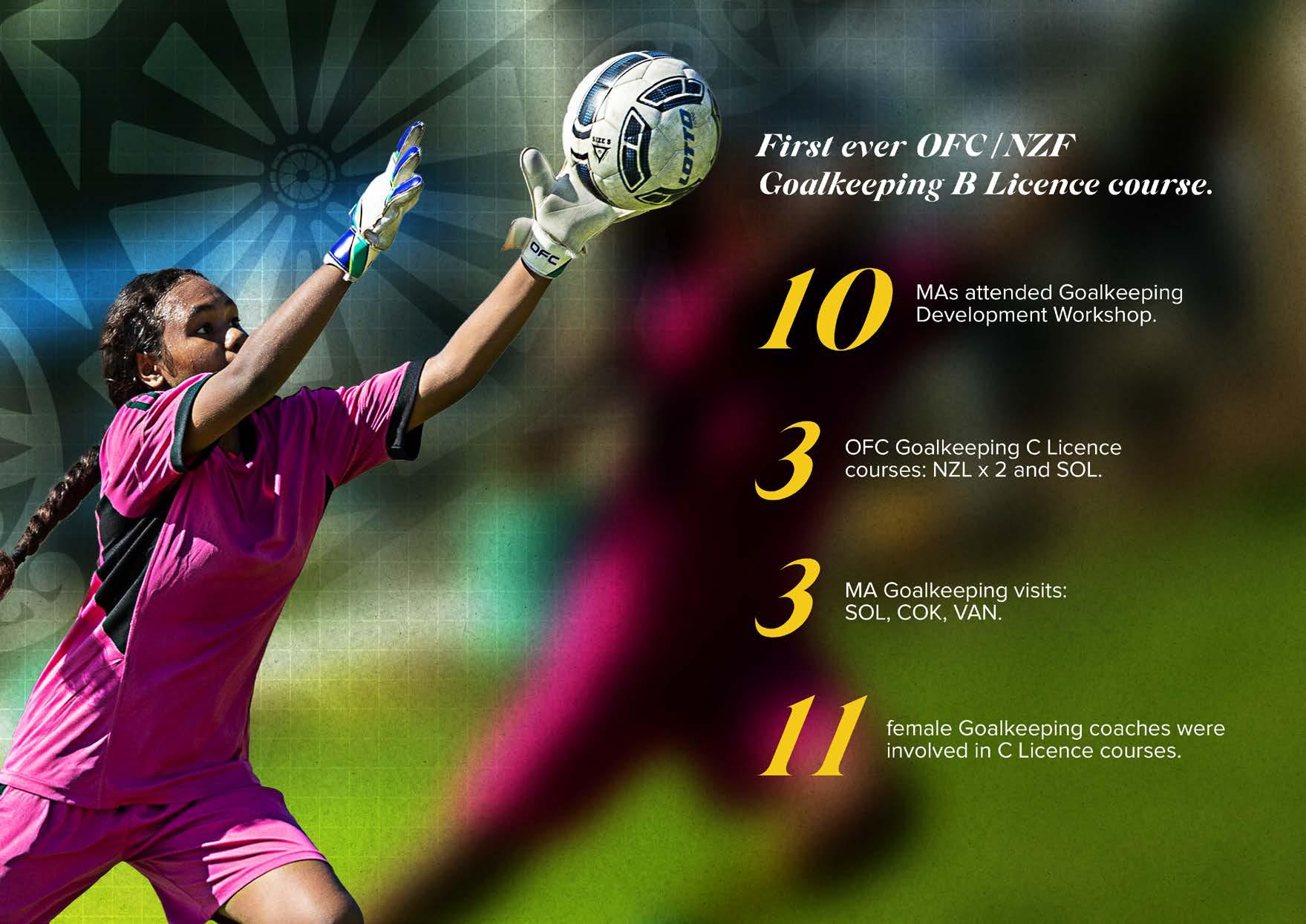
2024 was a celebratory year for Futsal in Oceania with the first OFC women’s senior futsal competition. Five Member Associations (MAs) took part in the inaugural OFC Women’s Nations Cup held in the Solomon Islands. New Zealand dominated the competition, winning the final 7-1 against Fiji to book their spot at the inaugural FIFA Futsal Women’s World Cup™ 2025 in the Philippines.
A key event on the calendar was the Futsal Development workshop in Noumea that ran for four-days. It brought together nine-member association futsal development officers to connect, discuss development topics and to observe the Futsal Champions League. The workshop covered areas such as social responsibility, safeguarding, strengthening domestic competitions, grassroots futsal and supporting the member associations to establish women’s national teams in their region.
The OFC Futsal Champions League was held in New Caledonia in April and contested by five member associations. New Caledonia’s AS PTT and Mataks FC from the Solomon Islands contested the final after both finishing the group stages with three wins. In front of a near capacity crowd, the home side clinched a thrilling 4-3 victory, to be crowned champions of the second edition of the OFC Futsal Men’s Champions League.
2023 OFC Futsal Men’s Nations Cup champions New Zealand made their debut at the FIFA Futsal World Cup™ in Uzbekistan. The Futsal Whites faced Libya in their first match, going down 3-1, Jordan Ditfort scoring New Zealand’s first ever goal at a FIFA Futsal World Cup™.
In game two, New Zealand briefly threatened the biggest upset in the tournament’s 25-year history early on before ultimately succumbing 7-1 to powerhouse Spain, before being beaten10-0 by Kazakhstan. Despite not having won a match, the World Cup rewarded the team with some valuable experience against some of the best countries and players in the world.
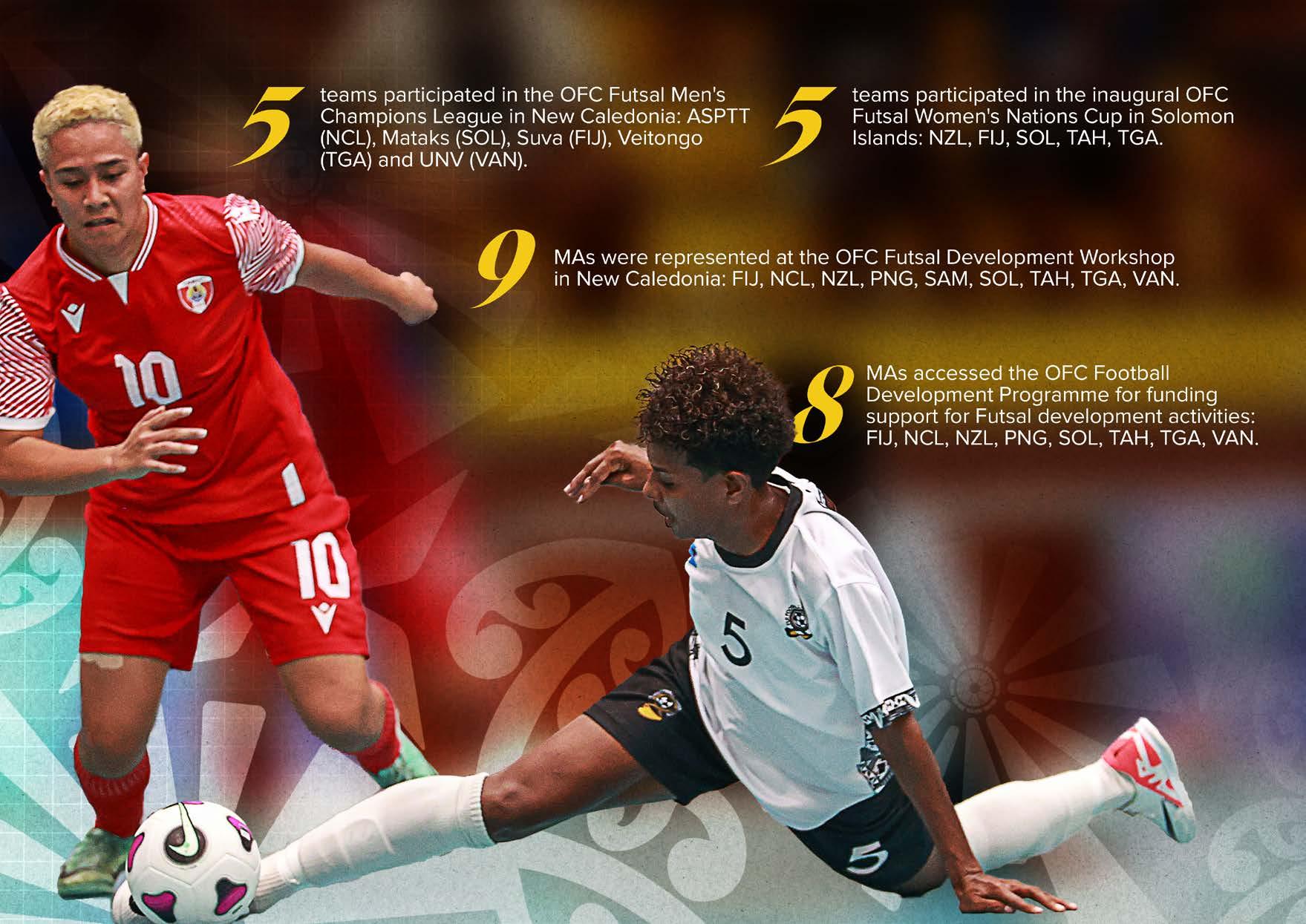
2024 welcomed a new contender in the Beach Soccer arena, Oceania’s most populous country, Papua New Guinea, who for the first time joined defending champions Tahiti, Fiji, and hosts Solomon Islands in Honiara for the OFC Beach Soccer Men’s Nations Cup.
Beach Soccer only really started in Papua New Guinea in 2023 on Fisherman Island, the 12 strong squad all hailed from the Moukele Football Association. Despite its infancy in Papua New Guinea, the sport has swiftly gained traction, with regular competitions and leagues emerging.
The OFC Beach Soccer Men’s Nations Cup saw Tahiti retain their title with a gripping 3-2 win over the hosts in front of a capacity home crowd, highlighting the popularity of the sport in the Solomon Islands. The victory will see the Tiki Toa represent Oceania at the 2025 FIFA Beach Soccer World Cup in the Seychelles. Competing for the first time debutants Papua New Guinea clinched their first ever win, defeating Fiji on the opening day.
Tahiti competed at their seventh FIFA Beach Soccer World Cup™ at the 2024 edition in the United Arab Emirates. Despite being thrown into a tough group, the Tiki Toa managed to progress to the knockout stages with a 4-3 victory over Argentina, and a stunning 5-3 win over former runners-up Spain. Their run ended in the quarterfinals though, suffering a 5-2 defeat to Italy.

A key initiative undertaken 2024 was the delivery of five Club Development Workshops, an improvement from 2023. OFC were able take a hybrid approach with both physical and online workshops for all Member Associations (MAs). Off-the-field topics were discussed, centered around administration and management development.
OFC worked with several clubs across the region on revenue generation, management of their clubs, tying it all into club licensing as well, using the FIFA Club Licensing guide. Particularly for women’s football, workshops were able to be designed that were contextual to each country but gave each country the opportunity to discuss club licensing in more detail. That was a big opportunity for OFC in 2024 and even better to be able to deliver them in person where you get to see the reality of clubs in the region.
OFC’s Introduction to Club Management workshop was delivered to six clubs based in Rarotonga (Matavera-Ngatangiia Football Club, Nikao Sokattak Football Club, Puaikura Football Club, Titikaveka Football Club and Tupapa-Maraerenga Football Club), the workshop was the first of its kind to take place in the Cook Islands and emphasised the importance of developing a club sustainably off the pitch and ensuring club administrators are equipped to take the next steps in their club’s evolution.
It was a pivotal time for the Member Association who are hosting OFC tournaments in 2025 for the first time since 2016.It was the perfect opportunity to see presidents, technical directors of clubs and club administrators, to introduce the different initiatives that that can take place on a national and local level to help develop their club.
12-time OFC Men’s Champions League winners Auckland City FC drew Bayern Munich, Boca Juniors, and SL Benfica in Group C of the FIFA Club World Cup 2026™. It shows the opportunities that are available for clubs in Oceania to be involved in football on the world stage and that investment from clubs in our region into the Champions League can bring significant rewards both on and off the field.
Forecasting the future, expect a lot more club activity, due to an increase in club competitions taking place in our region and the extension of the international competitions calendar. OFC will continue to provide financial support and help administratively help those clubs elevate their status.
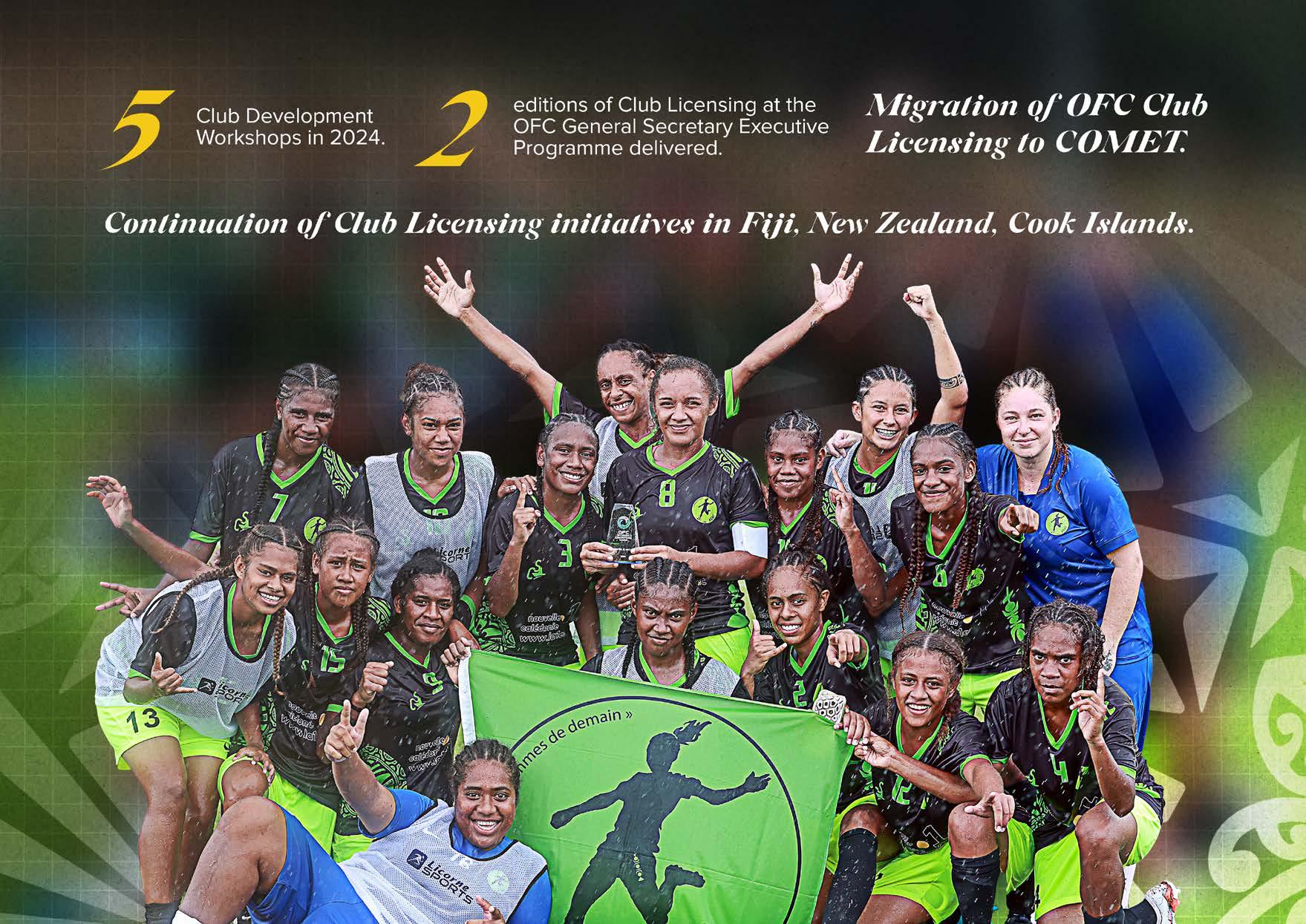
2024 was a year of achievements for football development across Oceania, with coaching education reaching new heights and unprecedented opportunities opening for aspiring coaches across the region.
The OFC/NZF Pro Licence coaching diploma, widely regarded as the global benchmark for elite-level coaching, was completed by 16 coaches from New Zealand, Fiji, Tahiti, and New Caledonia. This milestone signifies a major step forward in strengthening the coaching landscape, ensuring that Oceania-based coaches can compete with the best in the world.
It was also a year of firsts in goalkeeping education. The inaugural OFC Goalkeeping B Licence course was delivered for the first time in the region, while the Solomon Islands held their first-ever Goalkeeping C Licence, bringing together 17 participants from five OFC Member Associations (MAs). These initiatives are vital in providing specialized training and improving the overall quality of football development across Oceania.
In a significant moment for women’s football in Vanuatu, youth coaches Nesta Kate and Freda Warsal became the first females in the country to earn the OFC Senior C Licence. They were among 14 participants from five Member Associations who achieved the OFC Women’s-Only Senior C Licence in Suva, Fiji. Their success represents a major milestone for gender representation in coaching, paving the way for future generations of female coaches in the Pacific.
The momentum continued in digital learning, with OFC Learn experiencing a surge in engagement, reaching 10,514 registered users—an increase of more than 6,000 in just one year. The launch of NZFLearn as part of the OFC Learn platform allowed New Zealand Football (NZF) to offer tailored content and support while continuing to align with the purpose of OFC Learn: facilitated online learning and discussions for Member Associations.
The 2024 OFC Coaches Conference featured an impressive lineup of international and regional speakers, including Joe Montemurro, Head Coach of Olympique Lyonnais Women; Dr. Mark O’Sullivan, Associate Professor of Football at the Norwegian School of Sport Sciences; and former New Zealand international player Ryan Nelson, who provided a local perspective as the keynote speaker at the conference opening. Overall, the event attracted 500 registered coaches from across Oceania and Australia, offering valuable insights across three core focus areas: Grassroots, Youth Development, and High Performance. Each area featured three expert presenters, each delivering specialized sessions designed to equip coaches with cutting-edge knowledge and practices relevant to their coaching contexts. Ultimately, the conference successfully enhanced coaches’ understanding of the latest methodologies, coaching environments, and cultural considerations essential for effective coaching in their respective fields.
Fiji Football Association (FFA) was the second Member Association to receive the OFC Mentoring Programme, equipping 17 Fiji FA team members with the skills to become effective mentors. This initiative is part of a broader strategy to develop a mentorship framework across Oceania, with expansion planned for more Member Associations in the coming years.
In partnership with the OFC Social Responsibility team, a new online course, “Introduction to Safeguarding Children in Football,” was launched. This initiative ensures that football community members across Oceania gain essential knowledge to create safe and positive environments for young players. The course will be integrated into all Member Association coaching certificates, ensuring that over 2,500 people per year receive this critical training.
Through innovation, collaboration, and a commitment to excellence, football education in Oceania continues to break barriers, opening doors for coaches at all levels and strengthening the future of the game in the region.
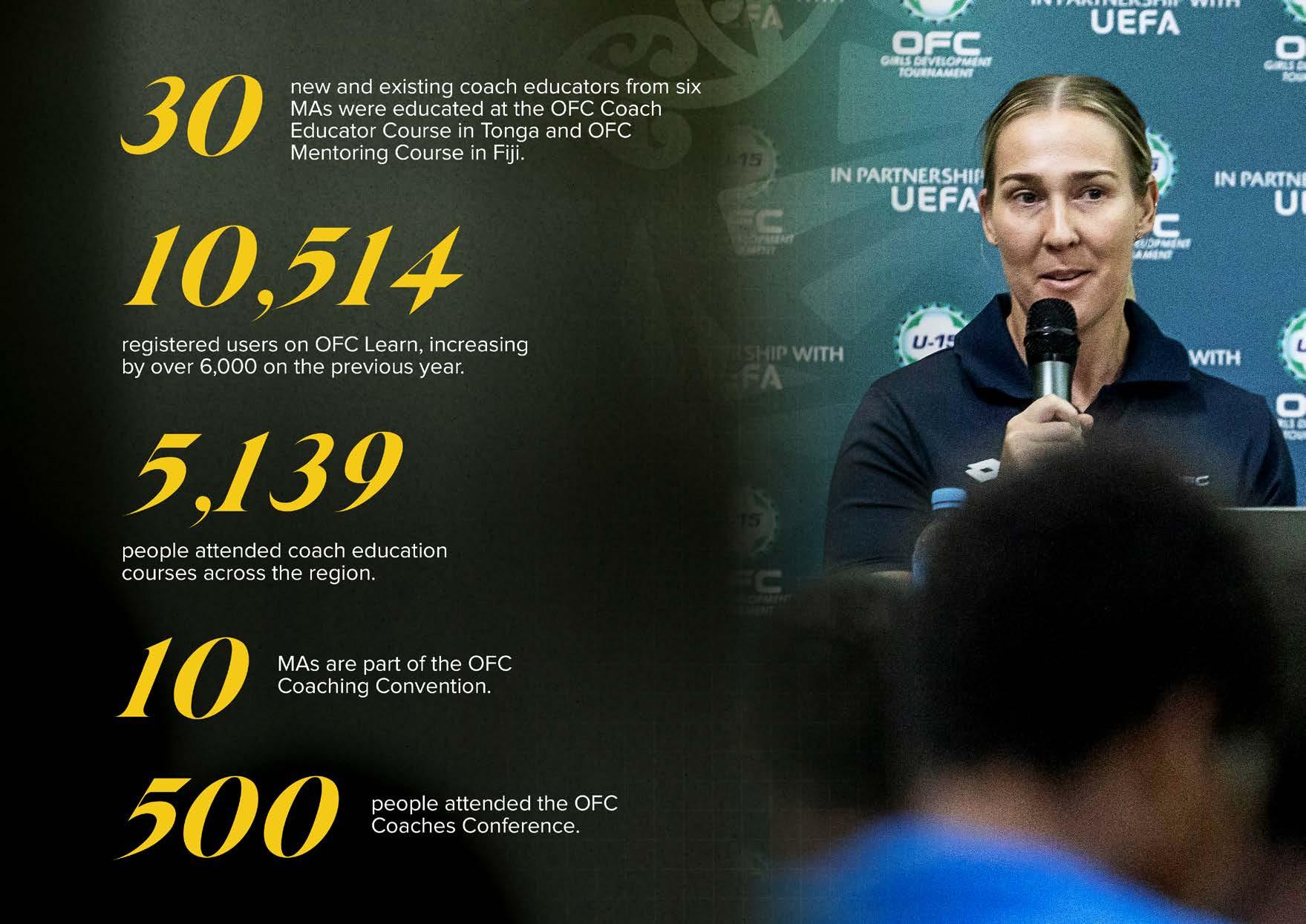
There was a higher level of activity from senior national teams in 2024, with Women’s and Men’s teams competing in 127 matches in tournaments and friendlies. This included New Zealand, Vanuatu and Papua New Guinea playing in the new FIFA Series pilot project in March. This initiative provided OFC Member Associations (MAs) with an opportunity to play international matches against sides outside of the confederation, with a view to increasing development opportunities previously unavailable.
Football Australia, in collaboration with OFC, have increased their national team activity in the Pacific region. Through PacificAus Sports, the Australian government are providing support to high-performance sport in the Pacific over a 4-year programme. This saw Australian Futsalroos play a three-match series against the Kurukuru in Honiara, while Australia’s U-17 men’s team travelled to play the U-19 men’s teams of Vanuatu and Solomon Islands. The partnership will provide national teams throughout the Pacific with increased exposure to elite-level competition, presenting ongoing opportunities for individual athletes, officials, and administrators to improve their skills and grow in confidence.
Samoa U-16 women’s team created history at the OFC U-16 Women’s Championship in Fiji by becoming the first Samoan team to qualify for a FIFA tournament. They will take part in the FIFA U-17 Women’s World Cup in 2025.
With the intention of launching a new National Academy in 2025, Fiji Football Association (FFA) in partnership with OFC visited high-performance environments in Australia, providing team members with an opportunity to gain better understanding of an elite high-performance level. Later in the year, OFC helped deliver a two-day workshop to more than 20 coaches from various districts, along with key members from the Fijian FA. The workshops were centered around two topics understanding talent development, and modern trends in football – transition.
The second edition of the OFC U-15 Development Tournament was delivered in partnership with UEFA Together in Fiji. Featuring representative women’s teams from Fiji, Cook Islands, New Caledonia, Papua New Guinea, Solomon Islands, Samoa, Tahiti, and Tonga. Teams were joined by New Zealand women’s national team players Grace Jale and Mackenzie Barry, and former Football Fern Kirsty Yallop as tournament ambassadors, with Yallop delivering a player education workshop at the tournament, drawing on insights from her extensive international and professional experience.
40 players between 15 and 16 are supported by a new National Academy programme in Solomon Islands, run by former local star Henry Fa’arodo Jr. The Academy is the first of its kind in Solomon Islands and paves the way for the next generation of Solomon football stars from the region. Tonga Football Association (TFA) also launched their talent development scheme programme, with four regional development centers created to develop young footballers of potential.
OFC led the delivery of anti-doping testing at the Women’s Olympic Football Tournament & Men’s Nations Cup. Teams were supported during the testing and players and staff were educated on the processes involved. This helps inform our football community, maintain integrity levels of OFC competitions, and ensure that OFC teams playing on the global stage are prepared to do so.
11 Member Associations have applied to be part of the FIFA Talent Development Scheme, with eight currently accepted by FIFA. They will receive funding and resources to further improve their development of young players of potential.

Exciting strides are being made as OFC gears up to introduce Video Assistant Referee (VAR) in 2026! The journey kicked off with five dedicated operators undergoing VAR training at the start of the year, paving the way for a more technologically advanced refereeing landscape. In a major boost to the project, Mihaly Fabian was appointed as OFC VAR Project Manager, officially taking up the role in August.
Referee development is also reaching new heights with the introduction of the OFC Badge System, to streamline the pathway toward FIFA accreditation, debuted at the OFC Men’s Champions League Qualifier in Tonga. These badges, categorised as OFC Badge (Category One) and OFC Academy Badge (Category Two), are awarded annually to match officials who meet specific fitness and technical criteria. Category One badge holders are considered elite prospects, eligible to officiate at higher-tier OFC competitions, while Category Two recipients start their journey at lower-tier events, with opportunities to progress. The badge syemphasized that the badges symbolize recognition of referees’ professionalism and potential, providing structured support and mentorship to help them achieve elite.
The commitment to growth and excellence continued as OFC welcomed New Zealand Football (NZF) High Performance Match Officials for an immersive two-day VAR course at the OFC Home of Football – Te Kahu o Kiwa. Participants gained hands-on experience with the VAR simulator, stepping into the roles of Referee, VAR, and Assistant VAR to navigate real match scenarios.
As part of an exchange program with the Argentina Football Association (AFA), Elite Referees Ben Aukwai (Solomon Islands) and Campbell-Kirk Kawana-Waugh (New Zealand) trained alongside top-tier referees in Buenos Aires and Mar del Plata. The OFC Futsal Men’s Champions League in New Caledonia saw international expertise in action, with officials from Argentina and Saudi Arabia officiating matches. This exchange paved the way for OFC’s own Antony Riley and Chris Simpson to be invited by the AFA to officiate in Argentina’s prestigious Futsal National Championship.
OFC referees continued to shine on the world stage! New Zealand’s Antony Riley and Chris Sinclair proudly officiated at the Men’s Futsal World Cup in Uzbekistan, including a
high-stakes Round of 16 clash between Thailand and France and a thrilling quarter-final battle between Paraguay and France.
Development efforts have also extended across the region. OFC successfully delivered a FIFA Regional Instructors course, uniting 20 participants from 10 Member Associations (MAs), alongside an OFC MA Fitness Instructors workshop in Auckland. An Elite Referee Seminar provided an invaluable opportunity for match officials to refine their skills in preparation for FIFA tournaments and the Olympics.
Women’s refereeing development continues to be a key focus. The OFC U-16 Women’s Championship Qualifying tournament in Auckland was a stepping stone for female match officials, with four of the five referees proudly holding the OFC Referee Academy badge as they progressed along their officiating journey. In Samoa, OFC facilitated a comprehensive course for 21 match officials (9 female, 12 male), featuring FIFA Assistant Referees, OFC Badge Officials, and Academy Officials.
Papua New Guinea took a strong step forward in empowering women in refereeing by hosting a dedicated five-day Women’s Referee Instructors course in Lae, emphasising the latest law changes for 2024/2025. Meanwhile, Beach Soccer refereeing received a boost with guidance from FIFA Beach Soccer Referee Instructor Lakhdar Benchabane (France) and OFC’s own expert, Neil Poloso, ensuring that match officials continue to grow and refine their skills in this dynamic format of the game.
Furthering the commitment to elite development, OFC delivered a Pre-Elite Women’s Referees and OFC Referee Fitness Instructors course, where 12 match officials engaged in rigorous physical training, fitness tests, and workshops. A special introductory session to VAR was met with enthusiasm, as OFC prepares to bring this game-changing technology to its competitions in the near future.
The dedication of OFC and its match officials continues to raise the standard, ensuring that the region is well-prepared for the challenges and opportunities ahead.

2024 was a transformative year for Social Responsibility (SR) as OFC restructured to embed ‘The Power of Football’ pillars across all aspects of the game. Guided by the Power of Football Strategy—aligned with the UN Agenda 2030, SDGs, and the Pacific Framework for Resilient Development—OFC focused on partnerships and impactful initiatives under four key pillars: inclusivity, resilience, sustainability, and opportunity.
OFC strengthened collaborations, renewing its MOU with UN Women to promote gender equality and launching a new partnership with UNICEF to enhance Just Play and emergency preparedness. A partnership with Team UP introduced two new Just Play curriculums, reinforcing football’s role in social development.
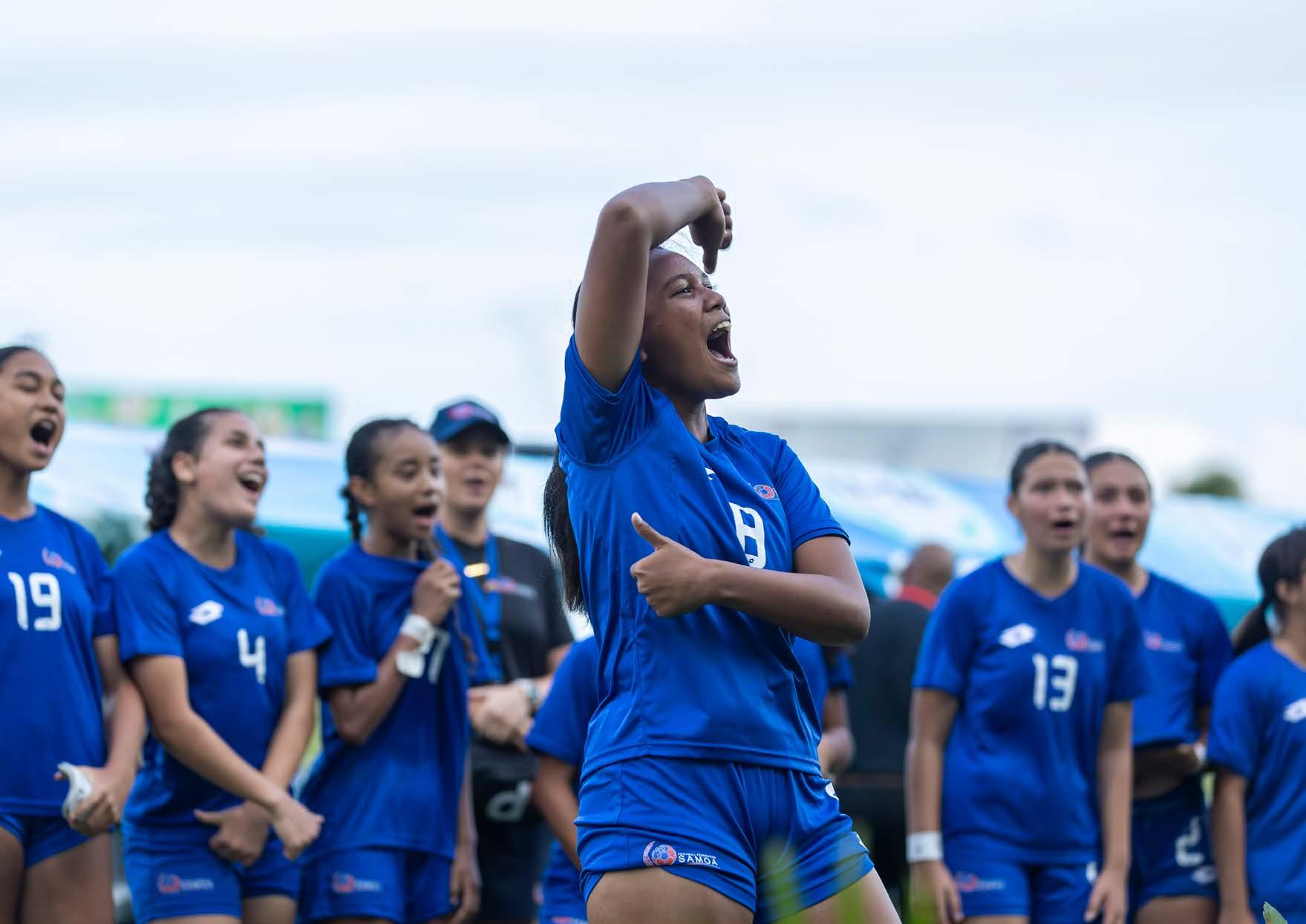
Safeguarding: A new reporting system using QR codes was trialled at OFC competitions, and 15 regional advocates joined the FIFA Guardians Diploma. Safeguarding training was integrated into coaching and refereeing workshops, and Safe Sport Day was marked across Oceania.
Gender Equality: OFC co-facilitated Just Play Gender Equality and TIHWF training with UN Women. The Solomon Islands hosted its first Women’s Football Symposium alongside the OFC Women’s Champions League. A regional digital campaign for 16 Days of Activism Against Gender-Based Violence promoted awareness and action.
Disability Inclusion: Research confirmed Just Play as one of the region’s few structured disability-inclusive football programmes. Fiji staff learned sign language, and inclusive events expanded in Samoa, PNG, and Tonga.

OFC initiated research into climate risks in football, with findings informing a 2025 sustainability strategy. The Just Play Emergency Preparedness curriculum was introduced, training regional trainers in disaster response. Following the Vanuatu earthquake, OFC and UNICEF deployed Just Play Emergency Response to support affected communities.
A study highlighted Just Play’s role in employability, showing its impact on skill development and career pathways. Social Responsibility Managers from nine countries attended OFC’s annual training in Auckland, while an exchange programme with Women Win and the U.S. Department of State empowered youth through leadership opportunities in Fiji and the U.S.
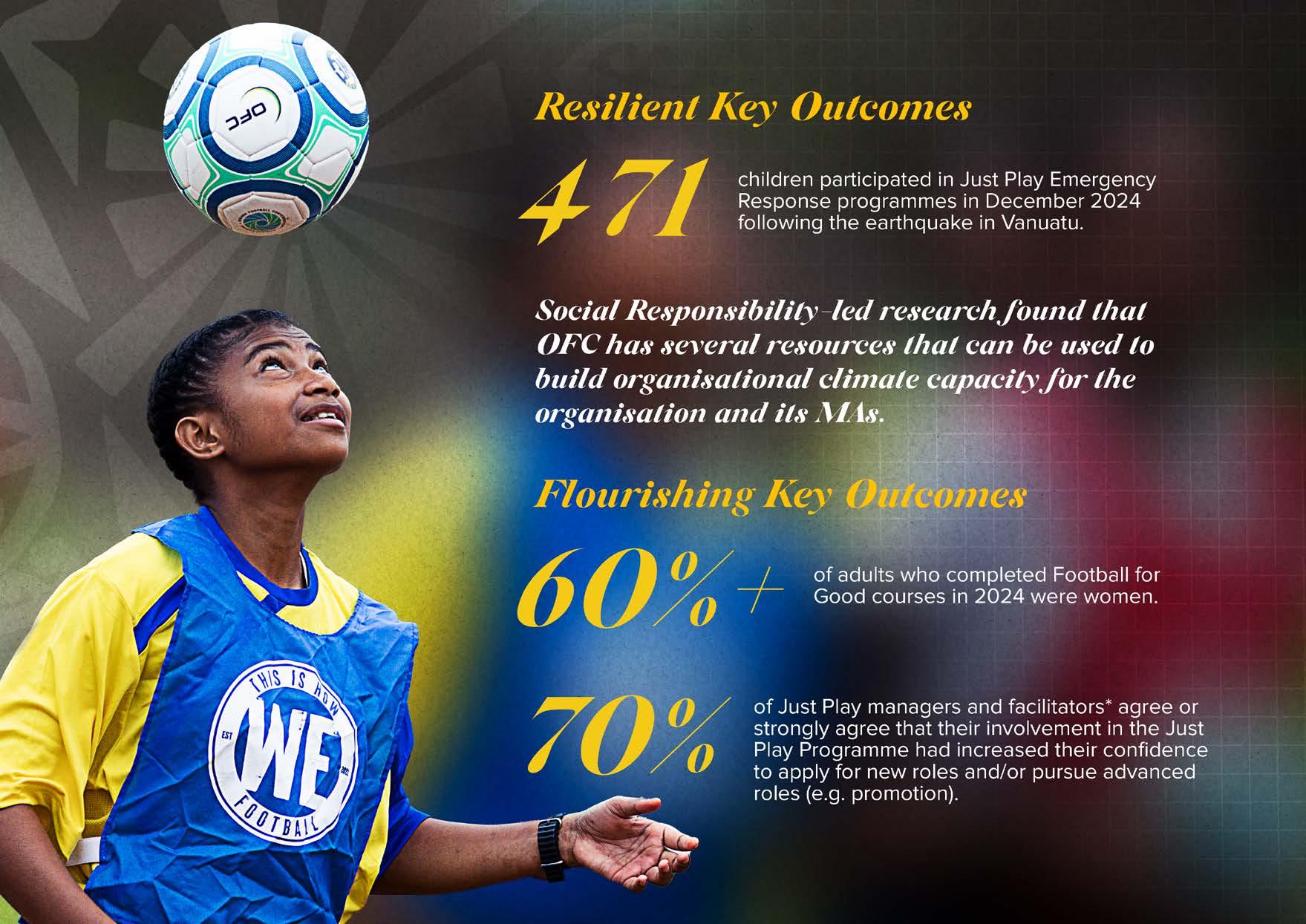

Chief Operating Officer’s Report Competitions
Member Association Services
Commercial and Communications
Finance and Services

Frederic Guillemont OFC Chief Operating Officer
Embracing excellence and achieving key results has once again been the mantra of the Operations Division in 2024. Building on the momentum of previous years, we made significant advancements across our strategic pillars of Education, Development, and High Performance, while maintaining our commitment to fostering professionalism and delivering exceptional results on and off the pitch.
Education remained a central focus of our operations, highlighted by the continued success of the OFC Executive Programme. This year, the programme brought Member Association (MA) leaders together again to enhance their capabilities in strategic development, organisational growth, and operational excellence. As a testament to OFC’s commitment to high performance, we were privileged to share the story of our transformation into a high-performing organisation at the Asian Football Confederation (AFC) Member Associations & Regional Associations Presidents’ & General Secretaries Conference. This opportunity underscored our growing reputation as a leader in football governance and professionalisation within the region.
OFC and UEFA launched a pioneering three-year strategic partnership, announced during a workshop in Düsseldorf, Germany, alongside Euro 2024. The collaboration emphasises football management and development through OFC’s Capacity Building Programmes and U-15 tournaments. The initial workshop, focusing on high-performance leadership, featured interactive sessions delivered by UEFA experts and representatives from European associations, fostering peer-to-peer exchange. OFC Member Associations have already reported positive impacts, highlighting improved insights into workload management and the establishment of high-performance cultures within their organisations.
In 2024, we surpassed expectations in digital growth, increasing our digital following, live-streaming views, and commercial revenue. The signing of FIFA+ as our livestreaming and media rights partner marked a significant milestone, amplifying the reach of OFC competitions and enhancing fan engagement worldwide. Additionally, securing Unilever, under the Rexona brand, as a key partner for the Oceania Qualifiers demonstrated the growing appeal of OFC’s competitions to global brands, contributing to a 34% increase in revenue—far exceeding our original target of 15%.
Under Finance and Services, we delivered exceptional performance in the FIFA Central Review for 2023. These results highlight OFC’s rigorous financial oversight, unwavering commitment to compliance, and dedication to best practices in financial management.
To further enhance financial governance across Member Associations (MAs), we developed and launched an innovative Financial Management Framework. This comprehensive framework, featuring detailed step-by-step guides, was successfully implemented in the Solomon Islands and Cook Islands, representing a significant milestone in capacity-building and operational enhancement for our MAs.
On the competitions front, we delivered an unprecedented 20 events including the U-15 Girls Development Tournament and 11 competitions over 12 months, with standout successes including the OFC Men’s Nations Cup and FIFA World Cup Oceania Qualifiers, The introduction of the first-ever Match Coordinator Programme elevated our operational standards, ensuring consistency and excellence in competition delivery. These achievements exemplify our commitment to creating memorable experiences for players, fans, and stakeholders alike.
High Performance remained a cornerstone of our work, with a focus on fostering excellence on and off the pitch. The signing of key commercial partnerships and the continuous refinement of the OFC Professional League project have positioned the confederation for long-term success.
Sharing OFC’s journey as a high-performing organisation on the global stage and expanding professional pathways for our Member Associations through innovative frameworks further underscore our dedication to elevating the game across Oceania.
Looking ahead, we are committed to sustaining this trajectory of excellence by driving growth and professionalisation throughout the region. The values of Excellence, Passion, Integrity, Empowerment, and Diversity will continue to guide every aspect of our work as we strive to provide positive experiences for all involved in football.
I extend my deepest gratitude to our Member Associations, partners, and colleagues for their unwavering dedication and collaboration. Together, we are building a legacy that will inspire and elevate football in Oceania for generations to come.
Merci Beaucoup!
2024 was OFC’s busiest year to date, with a record 20 events across 11 competitions hosted from February through to November.
It was a significant year at club and national level, for both men’s and women’s football, with a number of milestones and firsts achieved throughout the year.
The OFC Women’s Champions League grew for its second iteration, with eight teams competing, up from five for the inaugural tournament in 2023.
There was also a substantial increase in the number of qualification places for OFC nations at FIFA World Cups.
Two automatic qualification spots were available for the FIFA U-17 World Cup™, FIFA U-20 World Cup™ and FIFA U-20 Women’s World Cup™ respectively, whilst the FIFA U-17 Women’s World Cup™ saw an increase to three.
As a result of this, Samoa qualified for their first-ever FIFA World Cup™ at any level, when they finished runners-up at the OFC U-16 Women’s Championship – booking a place at the FIFA U-17 Women’s World Cup 2025, to be played in Morocco later this year.
Further development for the women’s game was evident with the inaugural OFC Futsal Women’s Nations Cup taking place in August of 2024 in the Solomon Islands – another important step forward in broadening the growth of women’s football across the region.
There was also the pleasing return of the OFC Futsal Men’s Champions League –held in New Caledonia – for the first time since 2019.
Off the pitch, 2024 also saw a significant step forward in OFC’s efforts to further develop skilled competition organisers across the region.
The OFC Match Coordinator Programme welcomed seven participants from OFC Member Associations—representing Tonga, Fiji, Vanuatu, Tahiti, and New Zealand— across a three-part learning journey in 2024.
The first two modules were delivered online in August and September, equipping participants with foundational knowledge and key competencies in match coordination. The third and final module took place in November, offering a handson experience during the FIFA World Cup 2026™ Oceania Qualifiers.
As part of the practical component, participants attended matches between Tahiti and Vanuatu, and New Zealand and Samoa, gaining real-time insight into match operations. The module concluded with an in-person workshop led by the OFC Competitions team at the OFC Home of Football – Te Kahu o Kiwa in Auckland.
The programme has been hailed as OFC’s first-ever educational initiative in competition management, describing it as a pathway to achieving consistent standards across regional competitions. Top performers from this programme may advance to the OFC Match Director initiative..
Through initiatives such as this, OFC aims to unify competition standards and foster a thriving network of regional competition managers, equipping them to elevate football across Oceania.
Another significant milestone was the establishment of a comprehensive four-year competitions calendar, integral to the Competitions strategy spanning 2025 to 2028. This advanced scheduling provides substantial benefits to Member Associations (MAs) and the OFC, enabling improved planning, better resource allocation, and greater clarity for preparation and participation. It facilitates long-term strategic decision-making, optimizes player development pathways, enhances logistical efficiency, and fosters stronger engagement with stakeholders, ultimately elevating the quality and consistency of football competitions across the region.
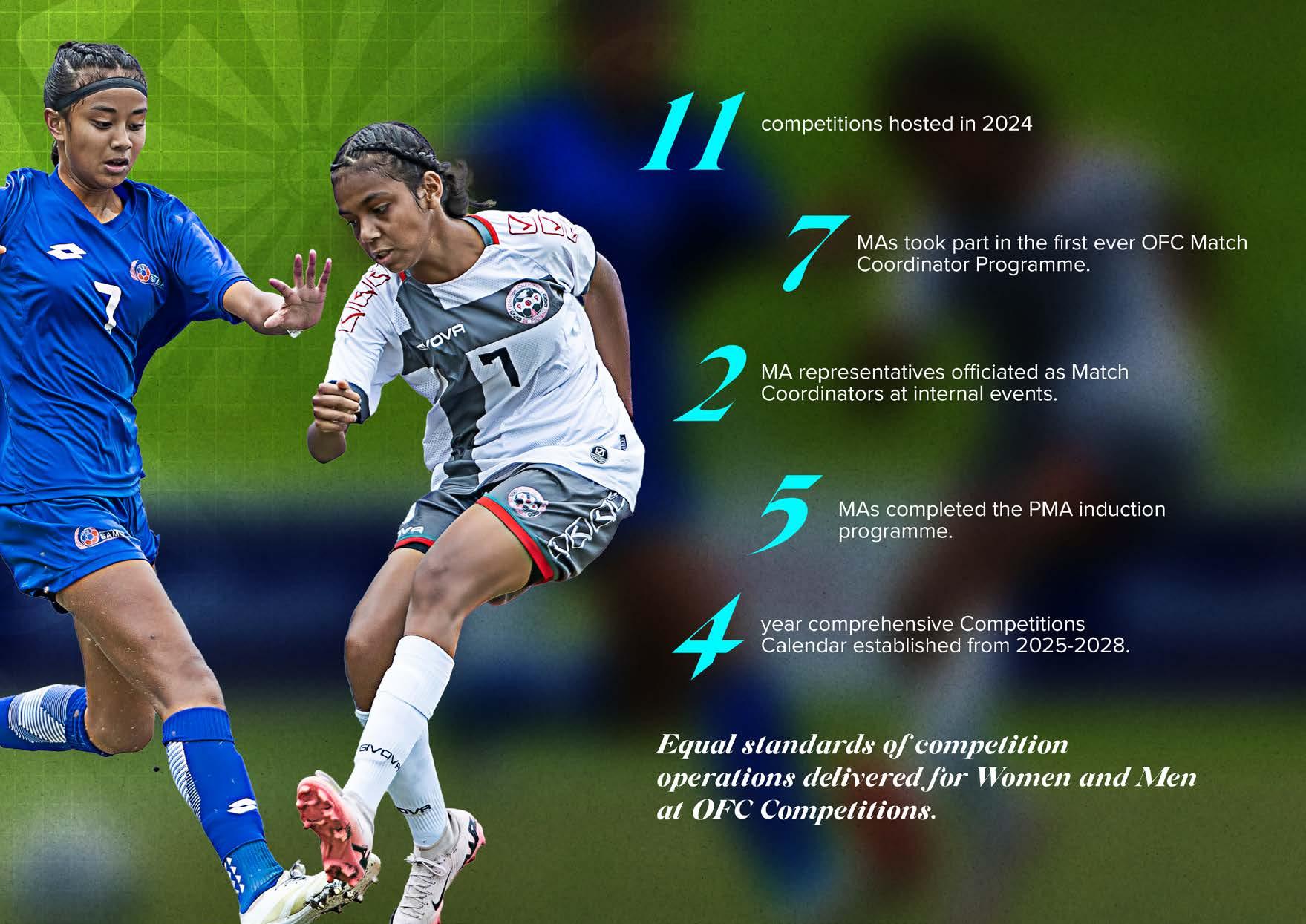
Samoa | February 2024
he fifth edition of the Women’s Olympic Football Tournament – Oceania Qualifier took place in early 2024, with the winner progressing to the women’s football tournament at the 2024 Olympic Games in Paris, France. The tournament was held in Samoa and was contested between eight nations, with two groups of four and the top two in each group progressing to the semi-finals.
It was a tight tussle in Group A, with Solomon Islands prevailing as group winner, following a 3-1 victory over Fiji in the final group match. Fiji’s wins over Papua New Guinea and American Samoa ensured they clinched second place and a spot in the semi-finals.
New Zealand went through Group B unbeaten, but it wasn’t without a fight, edging Tonga 3-0 in the opening match, before finding their rhythm against Samoa and Vanuatu. Victories in their opening match against Vanuatu and final group match against rivals Tonga, ensured Samoa reached the semi-finals for the first time at the Women’s Olympic Qualifying Tournament.
Two late goals from Sandy Aniholand and captain Ileen Pegi helped the Solomon Islands into their first qualifying final for the Women’s Olympic Tournament with a 2-0 win over hosts Samoa, while a hat-trick from Grace Jale propelled New Zealand to a dominant 7-1 victory over Fiji in the second semi-final. New Zealand saved their best performance for last, recording an 11-1 victory over Solomon Islands, to book their place at the 2024 Olympics in Paris.

The four-team qualifying tournament to determine the final participating team in the OFC Men’s Champions League 2024, took place in Tonga in February.
In a tightly contested group, Samoa’s Vaivase-tai FC finished top, just one point ahead of the Cook Islands’ Tupapa Maraerenga FC, to book their place in Tahiti.
A 14-0 victory over Vaiala Tonga SC on the final match day clinched qualification for the Samoans, who joined Group B in May in Papeete.
February and March saw the National Playoff played across the region, with Rewa FC, Hekari United, AS Magenta, Solomon Warriors, Ifira Black Bird FC, Auckland City FC and AS Pirae all successfully booking their places in the tournament over the two-legged ties.
The 2024 edition of the OFC Men’s Champions League was hosted in Tahiti, with eight teams once again competing to be crowned kings of Oceania. Defending champions Auckland City FC returned to defend their crown, having narrowly overcome Wellington Olympic AFC in the New Zealand National Playoff.
They were joined by host nation side AS Pirae, AS Magenta of New Caledonia, Rewa FC from Fiji, Papua New Guinea’s Hekari United, Vaivase-tai FC of Samoa, Solomon Warriors from the Solomon Islands and Vanuatu’s Ifira Black Bird FC.
Drawn in Group A, Auckland City FC had a tricky start, with a 2-2 draw in their opening match against Rewa FC, before scoring a last-minute winner in their second group stage encounter against Hekari United. Rewa FC won their subsequent two matches by the same scoreline, 3-2 - to confirm their place in the semi-final alongside Auckland City, ahead of Hekari United and Solomon Warriors.
Group B was a similarly tight affair, with AS Pirae and AS Magenta scoring match day one wins to give themselves an excellent start. Ifira Black Bird FC were unable to match their heroics from 2023 and were eliminated at the group stage. They were joined by qualification tournament winners, Vaivasetai FC of Samoa, whose young team will have benefited from the experience.
Two fiercely contested semi-finals saw Auckland City advance at the expense of AS Magenta with a 1-0 win, before a dramatic second match resulted in AS Pirae overcoming Rewa FC in extra-time.
Trailing 1-0 heading into stoppage time, AS Pirae turned the match on its head with two penalties in the space of a few minutes from Désiré Ngiamba,
putting them 2-1 up. Not to be undone however, Rewa hit back even later, when Samu Kautoga headed home in the 9th minute of added on time.
The Tahitian side rallied in the extra thirty minutes, scoring twice against their tired opponents, and sealing a 4-2 victory and a place in the final.
Their semi-final heroics took their toll on AS Pirae in the final. Auckland City FC showed their class, running out 4-0 victors. An early Michael Den Heijer strike was added to by Liam Gillion, Stipe Ukich and Christian Gray as the New Zealanders lifted the trophy for a record-extending 12th time.
Auckland City’s Liam Gillion took home the Golden Ball award, whilst teammate Conor Tracey secured the Golden Glove. Their side also clinched the Fair Play Award.
AS Magenta’s Germain Haewegene took the Golden Boot as the tournament’s top scorer.
Victory for the New Zealanders confirmed their place in the FIFA Intercontinental Cup 2024, where they lost their first-round match to UAE’s Al Ain.
The Kiwis can now look forward to the new FIFA Club World Cup™ in June 2025, where they will face FC Bayern Munich, SL Benfica, and CA Boca Juniors.

Solomon Islands | March 2024
The second edition of the OFC Women’s Champions League took place in 2024 and was held across three venues in Honiara, the Solomon Islands. The tournament saw an increase in teams from 2023, with eight teams participating. Host nation side Henderson Eels FC were joined by Labasa Women FC from Fiji, New Zealand’s Auckland United FC, AS Academy Féminine of New Caledonia, Avatiu FC from the Cook Islands, Vanuatu’s Tafea FC and Tonga’s Veitongo FC. The new format involved two groups of four, with the top two in each group progressing to the semi-finals.
Henderson Eels FC were drawn with 2023 runners-up Hekari United FC, Tafea FC and Avatiu FC in Group A, whilst defending champions AS Academy Féminine were joined by Labasa Women FC, Auckland United FC, and Veitongo FC in Group B. Group A was a two-horse race between Hekari United FC and Tafea FC, who drew the opening match of the tournament 1-1 at the SIFF Academy. Both clubs went on to win their remaining two fixtures, ensuring they advanced to the semi-finals.
Hekari United’s super goal difference ensured they claimed top spot in the group though, with Tafea FC in second place. Defending champions AS Academy Féminine got off to a bang with a 4-1 victory over Veitongo FC on matchday one but quickly fell away after a defeat to Auckland United FC. A Rene Wasi hat-trick inspired the New Zealand champions to victory, and they went on to secure top spot in the group with a 1-0 win over Veitongo FC.
The battle for second came down to Academy Feminine and Labasa Women in the final group game, but neither side could break the deadlock in a scoreless draw, meaning Labasa progressed to the semi-finals whilst the defending champions suffered an early exit.
Both semi-finals entered extra-time, with Hekari United FC overcoming Labasa Women 2-0 in the first semi to qualify for their second successive OFC Women’s Champions League final. Auckland United were also forced to dig deep in the second semi-final, edging Tafea FC 2-1 with a 104th minute winner from Danielle Canham.
Auckland United FC lifted their first OFC Women’s Champions League title with a 1-0 victory over Hekari United FC in the final at the National Stadium in Honiara. Bree Johnson’s first-half strike proved the difference, as Hekari United fell to a second consecutive final defeat.
Auckland United were also awarded the Fair Play award, whilst Talish Green won the Golden Ball award and teammate Amberley Hollis received the Golden Glove.
Tafea FC’s Jane Alatoa received the Golden Boot award as the tournament’s top goal-scorer with four goals.
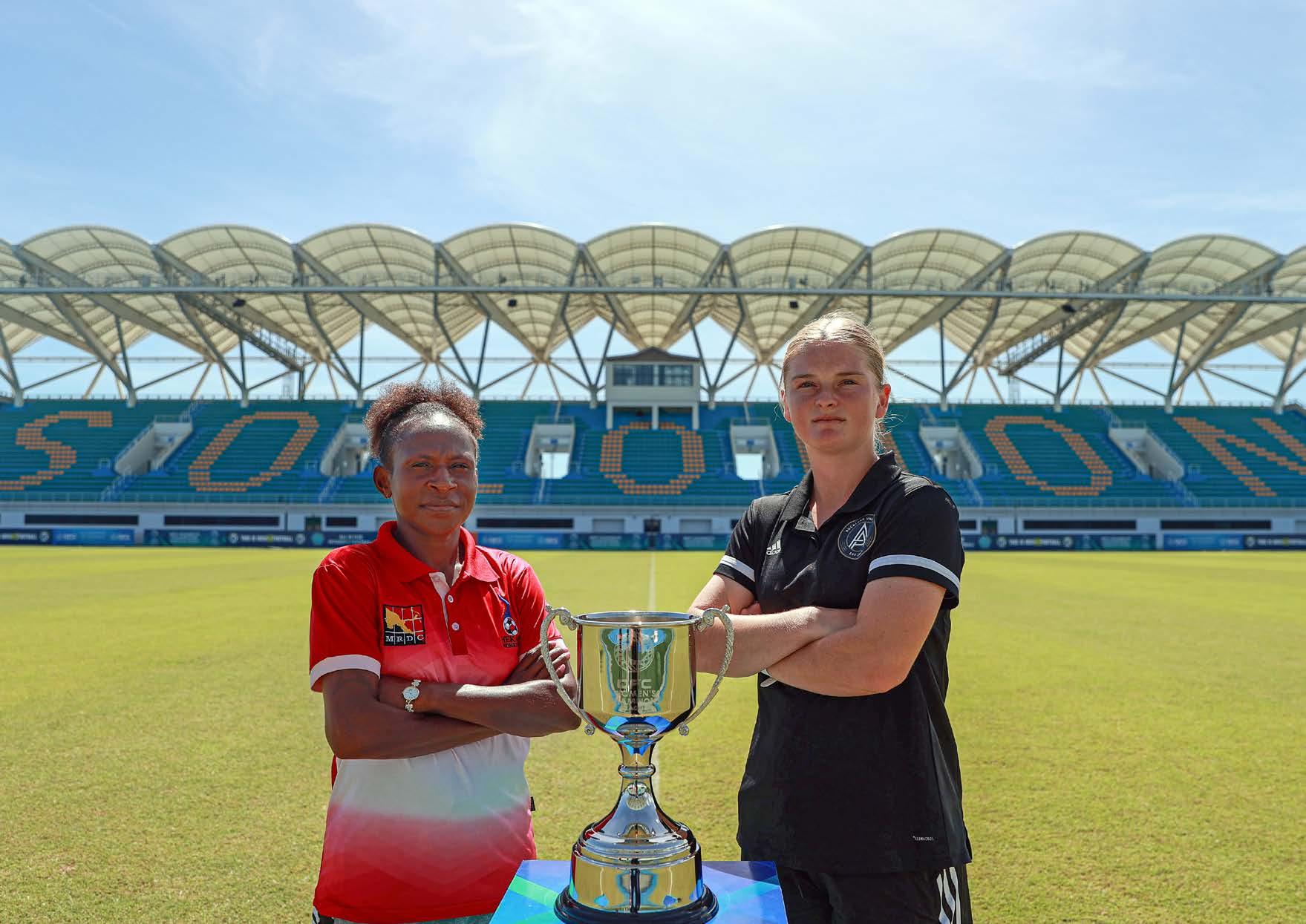
Qualifying Tournament | March 2024
Tonga, Samoa and the Cook Islands met in Tonga for the three-team qualifying group, in order to determine who would join Group B in June.
Samoa’s two wins from two clinched top spot, with a 4-1 victory over Tonga followed up by a narrow 1-0 win against Cook Islands to ensure they advanced to the main stage in June in Fiji.
The OFC Men’s Nations Cup returned following an eight-year, COVID-19enforced hiatus, as the best men’s national teams in Oceania met for the first time since 2016.
Group A, featuring Vanuatu, Solomon Islands and New Zealand was held in Port Vila, with Group B – comprised of Fiji, Tahiti, Samoa, and Papua New Guinea –based in Suva.
Due to civil unrest in their homeland, New Caledonia had withdrawn from the tournament, leaving Group A with three teams. New Zealand was the dominant force, winning both matches comfortably, 3-0 over Solomon Islands before a 4-0 victory against Vanuatu sealed their semi-final place.
Vanuatu secured a narrow 1-0 win over Solomon Islands in their fixture to ensure they would join the Kiwis in the semi-finals.
Group B was a competitive affair, with co-hosts Fiji the outstanding side in Suva. The Roy Krishna-inspired Bula Boys won all three matches, beating Tahiti 1-0 in their final group game to confirm their place at the top of the section.
The defeat proved a minor setback for Tahiti, who joined Fiji in the semi-finals, having registered a win and a draw in their previous matches before defeat to the co-hosts.
The tournament then shifted to Vanuatu, where New Zealand continued their dominant form in the semi-finals, seeing off Tahiti 5-0, with Kostas Barbarouses and Ben Waine each grabbing a brace to seal a place in the final.
The second semi-final was a much tighter contest, with Vanuatu holding off Fiji 2-1 to secure their place alongside New Zealand in the final. Jason Thomas scored the winner with a little over half an hour left to send the home fans wild. Tahiti recovered from their semi-final disappointment to overcome Fiji in the Playoff for 3rd place. Two goals from the excellent Teaonui Tehau gave Tahiti third place, having initially gone a goal down thanks to Roy Krishna’s strike.
In the final, Vanuatu suffered an early setback when Cam Howieson opened the scoring for New Zealand after just two minutes. Vanuatu recovered well though and were resolute in their defence for much of the remainder of the final.
A red card shown to Timothy Boulet, fifteen minutes from time, put paid to any real hopes of a comeback and New Zealand duly capitalised, scoring twice late on through Jesse Randall and Max Mata respectively to clinch the title for New Zealand.
New Zealand’s Max Crocombe was awarded the Golden Glove as the tournament’s best goalkeeper, whilst the Kiwis also took home the Fair Play Award. Their captain, Liberato Cacace won Golden Ball and Fiji’s Roy Krishna the Golden Boot.

Qualifying Tournament | April 2024
Vanuatu was the host for the four-team qualifying tournament ahead of the OFC U-19 Men’s Championship 2025.
The hosts showed themselves to be a level above, winning all three matches to finish top of the group. A 4-0 win over American Samoa, 3-0 against Tonga and a 2-0 victory over the Cook Islands meant they finished with a 100% record and without a goal conceded.
Samoa | July 2024
Samoa was the host for the OFC U-19 Men’s Championship 2024, with not just the trophy awarded to the winner, but two qualifying spots for the FIFA U-20 World Cup 2025 also on offer.
Fiji, Solomon Islands, Tahiti, and Vanuatu were drawn together in Group A, in what was a hotly contested group. Solomon Islands were the outstanding side in the group, winning three matches from three and not conceding a single goal in the process.
They were joined in the semi-finals by Fiji, virtue of an impressive 6-1 win over Vanuatu in their final group match to confirm their place. Despite finishing third and fourth respectively, Tahiti and Vanuatu’s campaign would continue with the subsequent play-off matches
Group B mirrored A with holders New Zealand completing a 100% group stage record, followed by New Caledonia, who won two from three. Samoa finished in third place, with Papua New Guinea finishing winless in fourth.
The two semi-finals provided some of the best action of the tournament. New Caledonia raced into a two-goal lead over Solomon Islands in the first semifinal, before being pegged back to 2-2. An 88th minute goal from Antonie Simane proved to be the winner – sealing New Caledonia’s place in the final and qualifying them for the FIFA U-20 World Cup 2025.
The second semi-final was also decided by one goal. New Zealand edging their way past Fiji thanks to Ryan Watson’s goal early in the second period. Fiji had a wonderful opportunity to level the score, only for Aidan Malakai-Singh to see his penalty saved well by Alby Kelly-Heald.
In the playoff fixtures, Vanuatu secured 7th with a 3-2 win over Papua New Guinea, before Tahiti clinched 5th, overcoming hosts Samoa 4-0. Solomon Islands recovered from their semi-final disappointment to beat Fiji 4-2 and seal third place.
New Caledonia met New Zealand in the final, with little to separate the two sides in the first half. A single strike from Lachlan Candy gave the Kiwis a halftime lead before they built on that advantage in the second period – a Luke Supyk double making it 3-0 before a late James Bulkeley goal sealed the win and the trophy for Chris Greenacre’s team.
New Zealand dominated the tournament awards, with captain Luka Coveny winning the Golden Ball, Keegan Kelly the Golden Boot, Alby Kelly-Heald the Golden Glove, as well as the team taking home the Fair Play award.
Both sides were able to celebrate their qualification to the FIFA U-20 World Cup 2025, to be held in Chile.

Qualifying Tournament | April 2024
Qualifying for the OFC U-16 Men’s Championship 2024 took place in Tonga, with Papua New Guinea, Solomon Islands, American Samoa and Tonga vying for the final qualification place.
Solomon Islands proved too strong in the four-team group – winning all three of their matches without conceding a goal to book their place in Tahiti, where they would join Group B.
Tahiti | July 2024
The OFC U-16 Men’s Championship 2024 was hosted in Papeete, Tahiti and marked the first time in OFC tournament history that the top three teams would earn qualification for a FIFA World Cup.
World football’s governing body announced earlier in the year that starting from the 2025 FIFA U-17 World Cup; to be hosted by Qatar for the next five years, the tournament would expand to 48 teams with Oceania granted three spots.
Eight teams competed in two Groups in Tahiti, with Group A involving New Zealand, Fiji, Vanuatu and Cook Islands and Group B featuring hosts Tahiti, New Caledonia, Samoa, and Qualifying winner Solomon Islands.
New Zealand stamped their mark on the tournament with three wins, to qualify for the semi-finals as Group A winner. They were joined by Fiji who had to come from behind to score a last-minute winner against Cook Islands and then beat Vanuatu to secure the runner up spot in the group.
Group B proved to be the proverbial ‘Group of Death,’ with Tahiti winning the group and New Caledonia, who had no points going into the final match day, sneaking into the runner-up spot ahead of Samoa who had caused the upset of the tournament by beating New Caledonia 2-0 in their opening match. Late goals helped New Caledonia overcome Solomon Islands 6-2, but it wasn’t until Tahiti scored the winner 12 minutes from time to crush Samoa’s hopes that New Caledonia could celebrate their confirmed final four place.
New Zealand proved too powerful in the first semi-final beating New Caledonia 5-0 while Fiji caused a big upset, toppling the hosts 2-1 in the other semi. As well as qualifying for the final, both winners booked their tickets to the FIFA U-17 World Cup in Qatar next year.
Samoa edged Cook Islands 1-0 to finish fifth with both teams achieving their best results at this level, whilst Solomon Islands edged Vanuatu to claim 7th.
There was agony and ecstasy on the final day with New Caledonia defeating Tahiti 5-4 on penalties to grab the third Oceania spot at the FIFA U-17 World Cup 2025 alongside New Zealand and Fiji.
In the final, the Kiwis took an early lead before being pegged back, only for New Zealand to score twice in the second half to secure the trophy with a 3-1 win.
New Zealand’s Aaron Cartwright won the Golden Boot with seven goals and was also awarded the Golden Ball for player of the tournament. New Caledonia’s Nicolas Kutran won the Golden Glove award for best goalkeeper while hosts Tahiti won the Fair Play award.
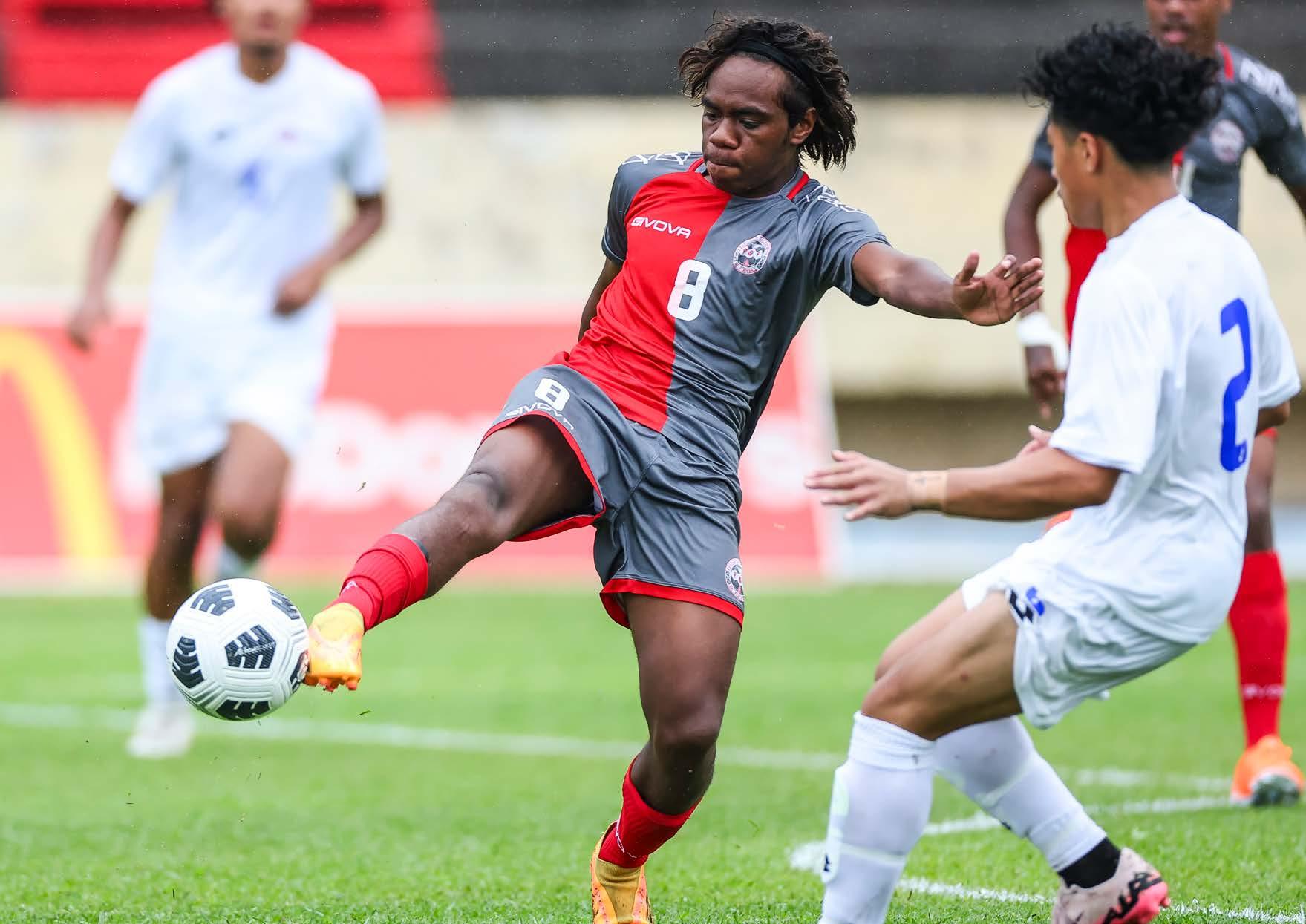
New Caledonia hosted the first OFC Futsal Men’s Champions League since 2019, with five teams competing in a single-group format.
COVID-19 had caused the 2020 and 2021 editions to be cancelled, leaving New Caledonia’s AS PTT, Mataks FC from the Solomon Islands, Vanuatu’s UNV FC, Suva Futsal Club of Fiji and Tonga’s Veitongo FC with the chance to become just the second winner in the competition’s history.
The round-robin format meant that the two teams finishing first and second would meet in the final, with those in third and fourth contesting the Playoff for 3rd place.
AS PTT and Mataks FC were the two outstanding sides across the group stage, both going undefeated as they finished first and second, respectively. AS PTT topped the group due to their superior goal difference.
UNV FC secured third place, with Suva Futsal Club’s final day defeat to AS PTT meaning they finished in fourth place. Veitongo FC ended the group stage in fifth place, losing four from four.
UNV FC clinched third place with a 2-0 victory over Suva Futsal Club, before AS PTT won a dramatic final against Mataks FC, winning 4-3 as the New Caledonians lift the trophy.
It was a clean sweep of the individual awards for AS PTT. Robert Freddy Forrest, James Namuli and Christ Pei shared the Golden Boot award, Matthieu Wassin won the Golden Glove, whilst Christ Pei won the Golden Ball. AS PTT also won the Fair Play award, with the Atta Elayyan award given to Jymaël UPA.
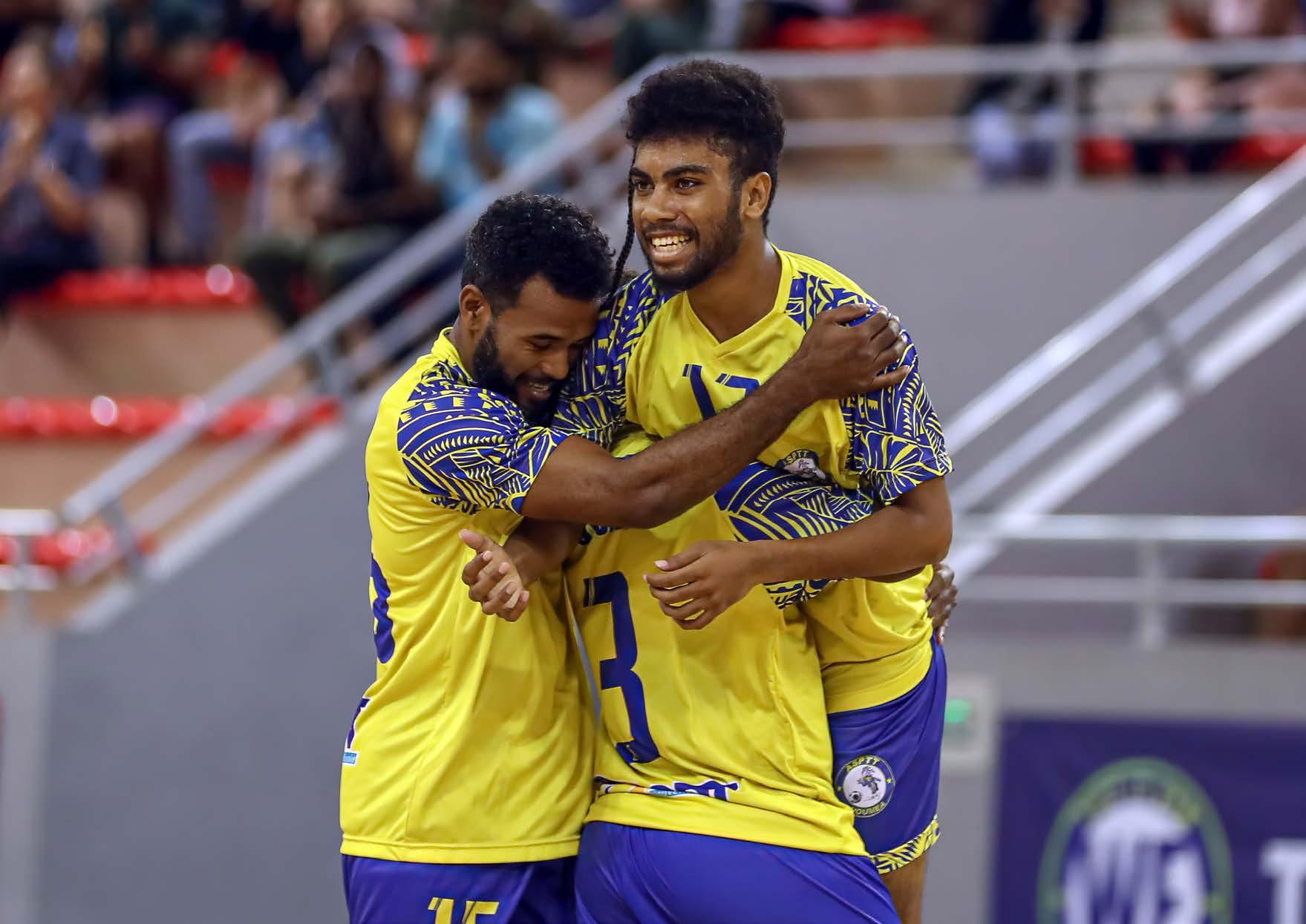
Qualifying Tournament | June 2024
Papua New Guinea, American Samoa and Samoa met in Auckland for the qualifying stage of the OFC U-16 Women’s Championship 2024.
It was the Samoans that proved the standout team, winning both of their matches by a score of 11-0, finishing top and joining Group A in Fiji.
The 2024 edition of the OFC U-16 Women’s Championship took place in Suva, Fiji, with eight nations competing to be crowned champions. Changes made to the FIFA U-17 Women’s World Cup format meant that in addition to the trophy, two qualification spots for the World Cup were also up for grabs.
Group A saw hosts Fiji joined by Cook Islands, Samoa, and Tonga. A dramatic final match day in the group saw Tonga and Samoa secure crucial victories to book their respective places in the semi-finals.
New Zealand were the favourites in Group B, drawn alongside New Caledonia, Tahiti, and Solomon Islands.
The Kiwis were in fine form throughout, winning three of three to confirm a semifinal berth. They were joined by New Caledonia, virtue of a 3-1 victory over Tahiti in their final group stage match.
The semi-finals saw Samoa and New Zealand book their place in the final. Both sides continuing their record of not having conceded a goal, with Samoa beating New Caledonia 2-0 and New Zealand comfortably securing the win over Tonga, 8-0. The results meant that regardless of the outcome in the final, both sides qualified for the FIFA U-17 Women’s World Cup in 2025.
The following day, Tahiti took 7th place with a come-from-behind 2-1 win against Cook Islands, before Fiji secured 5th in front of their home fans with a 1-0 victory against Solomon Islands.
Tonga completed their impressive campaign with a 1-0 win over New Caledonia in the Playoff for 3rd place. A second-half goal from Kuria Malohifo’ou proving the difference between the two sides.
In the final, New Zealand proved too strong for a spirited Samoa side, running out 4-0 victors. First-half strikes from captain Katie Pugh and Pia Vlok set the Kiwis on their way, before Vlok got her second early after the restart and Laura Bennett completed the scoring in the 90th minute.
New Zealand also picked up the Fair Play award, with Laura Bennett taking home the Golden Boot and Pia Vlok the Golden Ball. Samoa’s Margaret Fagasuisui Tuii was awarded the Golden Glove.
Despite defeat, Samoa can take immense pride from becoming the first national team at any level in the country’s history to qualify for a FIFA World Cup.
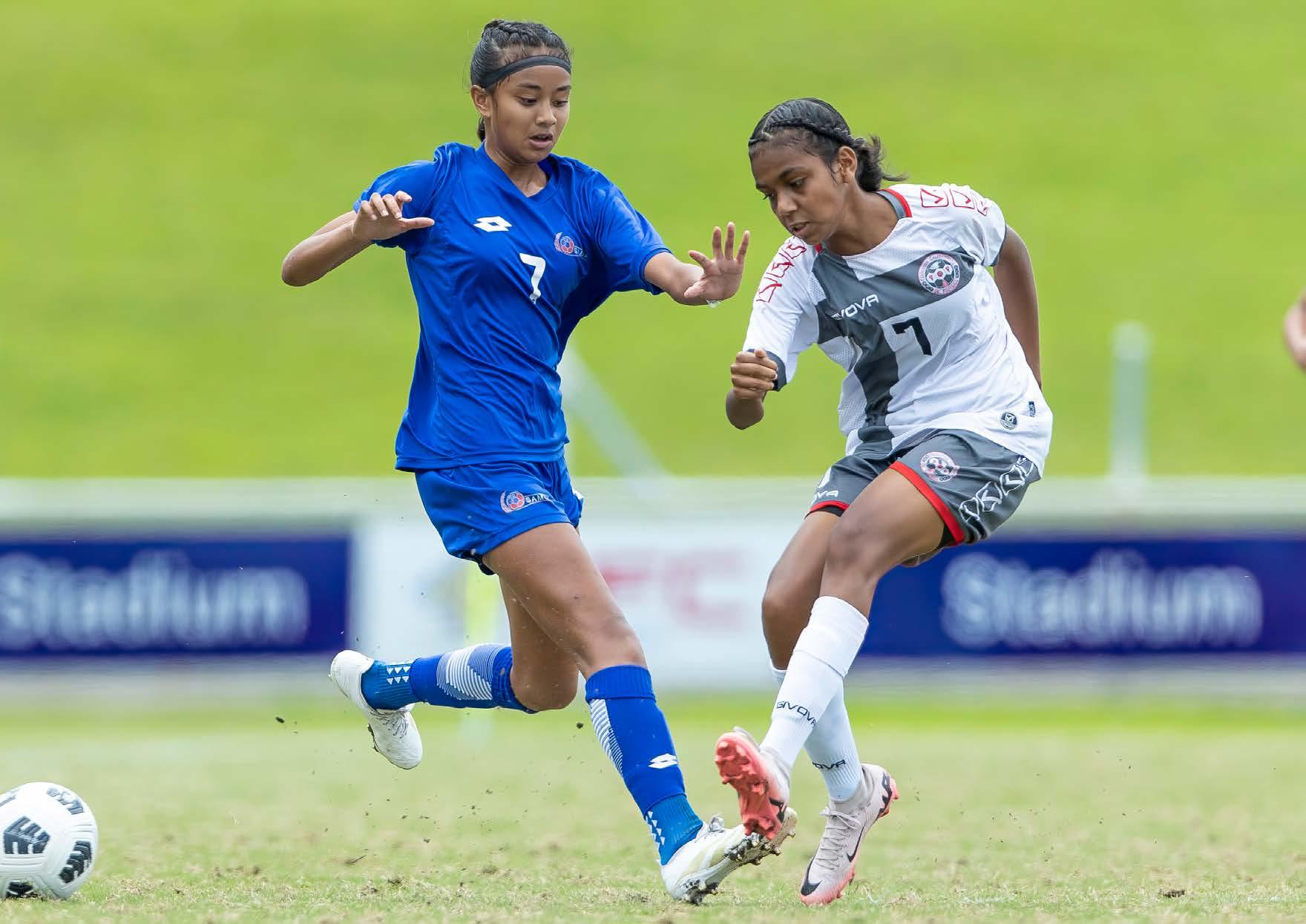
Solomon Islands | August 2024
The inaugural OFC Futsal Women’s Nations Cup took place in Honiara in the Solomon Islands in August of 2024, with five nations contesting the tournament to crown the first-ever champions.
A single group format was implemented, with the teams finishing first and second contesting the final and those finishing in third and fourth respectively meeting in the Playoff for 3rd place.
New Zealand entered the tournament as favourites and backed up that tag with an impressive opening day 10-0 victory over Tonga. Fiji also registered a win on day one, beating Tahiti 2-1.
Fiji followed up that success with a 4-0 success over Tonga the following day, before hosts Solomon Islands opened their campaign with a defeat, going down 5-1 to Tahiti.
Match day three saw New Zealand continue their good form, beating Fiji 9-1, whilst Solomon Islands got their first points, with a 2-0 win over Tonga, much to the delight of the passionate home crowd inside Friendship Hall.
Tahiti made it back-to-back wins with a comfortable 5-0 win against Tonga, whilst New Zealand saw off the Solomons 4-0 later that same day, all but confirming their place in the final.
The last day of group stage action saw New Zealand complete a 100% record, overcoming Tahiti 6-1 to book their place in the final, where they would meet Fiji, who defeated Solomon Islands 6-2.
The Playoff for 3rd place was the match of the tournament. Tahiti met hosts Solomon Islands, with four goals scored in the final five minutes, as the match swung back and forth. In the end, it was Tahiti who prevailed, holding on to win 4-3 and take the bronze medal.
New Zealand and Fiji met in the final, with the Kiwis proving too strong with an excellent second-half performance. A goal late in the first half meant it was only 2-1 at the break, but New Zealand pulled away in the second period, scoring five times to secure a 7-1 victory and ensure the first-ever OFC Futsal Women’s Nations Cup trophy would be heading to Aotearoa.
As well as the trophy, victory meant that New Zealand would represent Oceania in the inaugural FIFA Futsal Women’s World Cup™, to be played in the Philippines in 2025.
Solomon Islands won the Fair Play award, whilst Koleta Likuculacula took home the Golden Boot award as top scorer. New Zealand’s Danielle Bradley won the Golden Glove as the tournament’s best goalkeeper, with her teammate and captain Hannah Kraakman winning the Golden Ball award for the tournament’s best player.

Solomon Islands | October 2024
For the first time the OFC Beach Soccer Men’s Nations Cup was held in Honiara in the Solomon Islands. The host nation was joined by defending champions Tahiti, Fiji, and tournament debutants Papua New Guinea.
The Solomon Islands Football Federation had built a brand-new Beach Soccer pitch at the SIFF Academy and the stands were packed each match day with passionate home fans. The opening day’s rain did nothing to dampen the occasion as Papua New Guinea - in their first ever international Beach Soccer matchstunned Fiji 8-6 before, in what may be seen as the greatest Beach Soccer match ever played in Oceania, Tahiti came back from two goals down early in the final period to beat Solomon Islands 10-9.
While Papua New Guinea suffered heavy defeats to both Tahiti and the Solomon Islands in their remaining group games, they scored 17 goals at the tournament and showed they will be a Beach Soccer force in the future.
Fiji, after a 10-1 defeat by Tahiti, rebounded in their final group game to beat the Solomon Islands in a penalty shootout, but it wasn’t enough to dislodge the hosts from an appearance in the final against Tahiti.
Fiji claimed 3rd with a 5-0 win over Papua New Guinea, before Tahiti edged past Solomon Islands 3-2 in a pulsating finale in front of a capacity crowd.
The Tiki Toa – led by inspirational captain Raimana Li Fung Kuee, will represent Oceania at the 2025 FIFA Beach Soccer World Cup in the Seychelles.
Li Fung Kuee was awarded the Golden Ball, whilst Tahiti goalkeeper Teave Teamotuaitau won the Golden Glove, with teammate Heirauarii Salem winning the Golden Boot. Fiji prevented a clean sweep of the honours by claiming the Fair Play award.
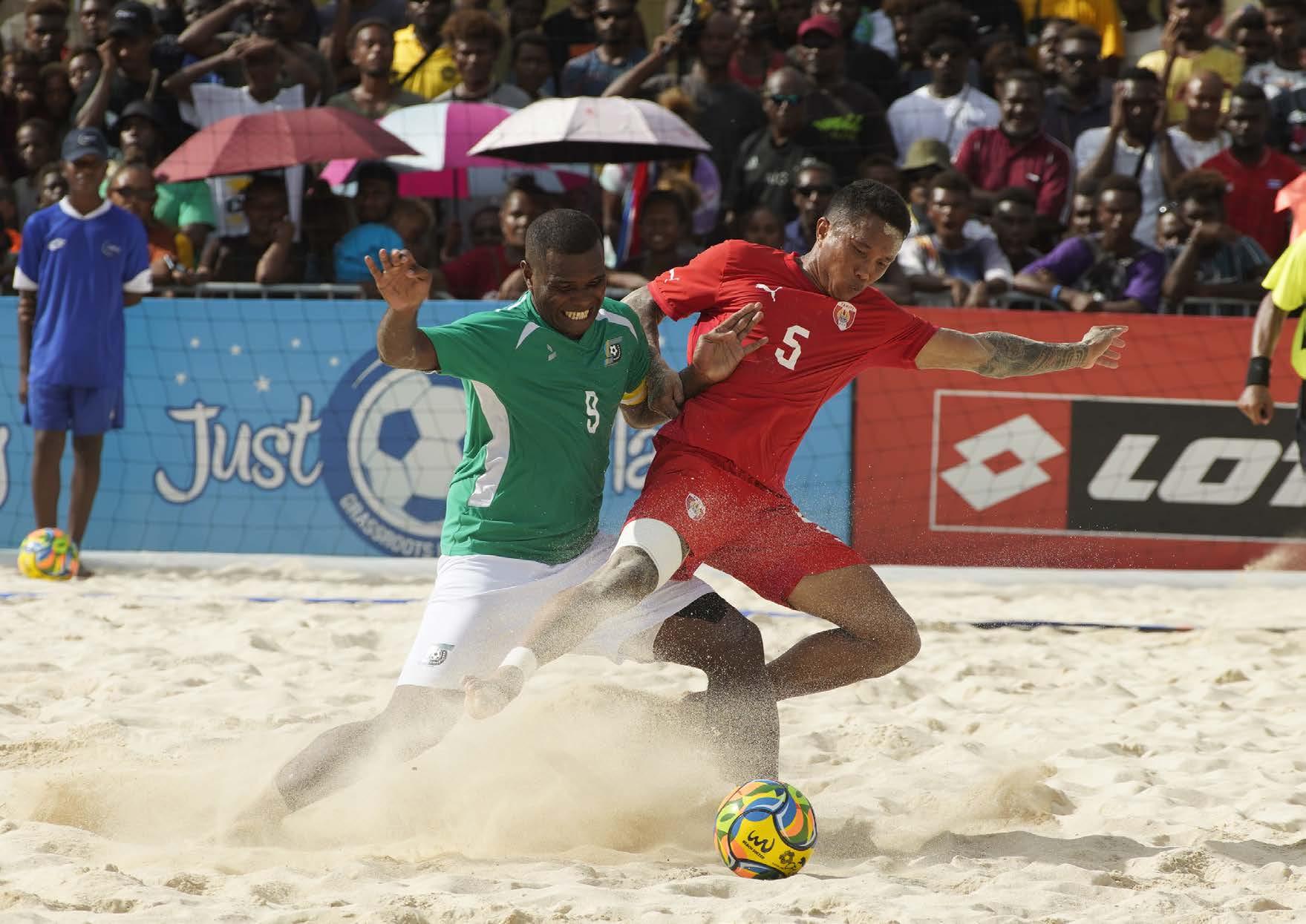
Samoa, New Zealand, Vanuatu, Papua New Guinea | September – November 2024
The Road to the FIFA World Cup 26™ began in 2024, with expansion to a 48-team tournament ensuring that Oceania receive one direct entry, with an additional playoff place also available.
Round one was held in Apia, Samoa, with the hosts joined by American Samoa, Cook Islands and Tonga to determine who would advance to round two’s group stage.
Wins for Tonga and Samoa saw both sides advance to the final, with the home side securing a narrow 2-1 victory in Apia to advance to Group B the following month.
Round two was split across four locations, with Group A matches played in Fiji and Papua New Guinea and Group B in Vanuatu and New Zealand respectively. New Caledonia topped Group A, with Fiji finishing runners-up to book their semi-final places. Papua New Guinea’s hopes of making the most of a first men’s international appearance on home soil in seven years was dealt a fatal blow when they conceded a dramatic late equaliser in a 3-3 draw with Fiji in Port Moresby.
In Group A, New Zealand led the way, with three wins from three seeing them finish first, with Tahiti joining them in the final four, virtue of a 2-0 victory over Vanuatu in Auckland.
The semi-finals and final will take place in New Zealand, with New Caledonia facing Tahiti and New Zealand taking on Fiji in Wellington, before the two winners meet in Auckland for a place at the FIFA World Cup 26™.
The runner-up will still have an opportunity to qualify, via the FIFA Intercontinental Playoff Tournament.

Member Association Services (MA Services) played a pivotal role in 2024, continuing its mission to support Member Associations (MAs) in achieving excellence in governance and management. Through a series of high-impact initiatives aligned with OFC’s 20232026 strategy, the department strengthened organisational capacity and leadership across the region.
The OFC Executive Programme for General Secretaries, launched in 2023 to accelerate organisational growth, remained a flagship initiative in 2024. Featuring two in-person workshops and a dynamic series of webinars, the programme provided General Secretaries with critical insights into leadership, organisational performance and management.
The July workshop in Auckland focused on high-performance leadership, including an interactive session on channelling ‘the corporate athlete,’ which emphasised sustaining peak performance by managing physical, mental, and emotional capacities to maintain resilience in high-pressure corporate environments. Financial management and digital marketing were also key topics. Football Australia Chair Anter Isaac led an in-depth session on financial best practices and their long-term benefits for MAs, while Football Australia Deputy Chair Jackie Lee-Joe shared a compelling case study on the Matildas’ extraordinary success through digital marketing.
The November workshop in Lautoka, Fiji, expanded on high performance leadership, covering leadership styles, emotional intelligence, and authentic leadership. The workshop also explored the power of digital strategies and mobile journalism, leading practical sessions on leveraging a digital-first approach to enhance communication and engagement within football administration.
OFC’s partnership with UEFA marked a significant milestone in 2024. The three-year partnership was launched in Düsseldorf and a part of the collaboration, OFC and UEFA will work together in the areas of football management within the OFC Capacity Building Programmes, and on football development with OFC U-15 tournaments.
During a workshop in Düsseldorf, Germany, held alongside Euro 2024, UEFA and the OFC launched a strategic partnership focused on enhancing football development. The workshop centered on high-performance leadership, featuring interactive sessions
delivered by UEFA experts and European association representatives. This platform facilitated valuable peer-to-peer learning, providing OFC Member Associations with insights on workload management, fostering high-performance cultures, and improving overall professionalisation in football management strategies. The workshop marked a key step in advancing OFC’s Capacity Building Programmes and supporting future football growth in the region.
A key development in 2024 was the rollout of the Corporate Management Framework, designed to strengthen corporate governance and operation management within Member Associations. Developed in 2023, the framework encompasses strategic and operational structures, capacity and competencies. Throughout the year, it was introduced in Fiji, while Solomon Islands and Cook Islands received targeted sessions focusing on financial management.
Further reinforcing the commitment to leadership development, a two-day Head of Department workshop was held in Lautoka, Fiji, for the Fiji Football Association (FFA). this initiative empowered FFA’s department heads and managers, fostering a culture of excellence and innovation in football management.
Significant strides were made in development with the initiation of three key modules as part of the Football Management Certificate for MAs’ Heads of Departments: Leadership, Introduction to the World of Football, and Football Development. These modules were designed to enhance knowledge, strengthen leadership capabilities, and foster a deeper understanding of the game, reinforcing OFC’s commitment to advancing football across the region.
Ensuring transparency and accountability remained a priority, with Central Reviews for Development Programme funding from 2023 successfully completed across all OFC Member Associations.
By strengthening governance, leadership, and operational efficiency, MA Services continues to drive progress, equipping MAs with the tools and expertise to navigate the evolving landscape of global football management

2024 was year of high performance for Commercial and Communications, with significant achievements in digital engagement, livestreaming, and the onboarding of key commercial partners. These successes have laid the foundation for a stronger and more visible OFC brand, while aligning with our strategic goals of expanding fan engagement, fostering partnerships, and driving innovation.
OFC experienced exceptional growth across its digital platforms, with the number of fans and followers increasing from 239,947 in 2023 to 286,456 in 2024, reflecting a 19% increase. Engagement metrics soared, with interactions climbing from 2,223,928 in 2023 to 2,689,986 in 2024, an increase of 21%. Livestreaming views saw an even more dramatic rise, increasing from 1.09 million in 2023 to 2,278,271 in 2024, an 81% growth. The total number of cross-network impressions reached 59.8 million, marking an outstanding 377.5% increase, while YouTube views totalled 1.1 million. Additionally, post link clicks surged by 134.5% to 375,000, further demonstrating the effectiveness of the content strategy in driving audience engagement and interaction.
A key milestone in 2024 was the successful partnership with FIFA+, serving as OFC’s official livestreaming and media rights platform. This collaboration elevated the visibility of OFC competitions, enabling fans across the globe to experience the action in realtime. This achievement has been instrumental in enhancing fan engagement and establishing a more professional image of Oceania football on the international stage.
The Commercial and Communications team played a vital role in supporting the successful delivery of 20 events and 11 competitions in 2024, ensuring operational excellence through branding and signage, broadcast production, marketing and promotion, and media operations. A highlight of the year was the 30th OFC Ordinary Congress, held in Bangkok, Thailand, on 16 May 2024. This milestone event was a key moment for OFC, highlighting professionalism and collaboration across Member Associations and reinforcing the confederation’s strategic goals.
As part of our commitment to content excellence, the Commercial and Communications team undertook Mobile Journalism Workshops in 2024, equipping the team with advanced tools and techniques for creating high-quality digital content. This initiative aligns with OFC’s broader strategic objectives for 2025, which include extending these
workshops to all staff and Member Associations to strengthen storytelling capabilities across the organisation. This effort will tie directly into the 2025 Content Strategy, where the division aims to implement an annual content calendar for all departments, ensuring consistent and impactful communication aligned with OFC’s goals.
Under the pillar of education in the OFC strategy, the organisation has made significant strides in developing local broadcasting capabilities. In 2024, OFC upskilled local broadcasters in Solomon Islands, Tonga, and Samoa, ensuring a sustainable approach to media coverage that promotes local talent while reducing long-term costs. This investment in capacity building will enable these broadcasters to be contracted for future competitions, enhancing the professional standards of football coverage in the region and reinforcing OFC’s commitment to sustainable development.
Additionally, Member Association Media Officers in Tonga and Tahiti were upskilled, giving them the ability to independently run and operate OFC competitions. This initiative is a crucial step in creating a pathway for these officers to potentially work at FIFA competitions in the future, ensuring that OFC Member Associations are equipped with skilled professionals who can contribute to the global football landscape.
The signing of two major commercial partnerships, Unilever’s Rexona brand and FIFA+, represented a significant step forward in OFC’s commercialisation efforts. These partnerships not only enhanced the organisation’s global visibility but also contributed to a 34% increase in revenue, far surpassing the target of 15%. This growth highlights the success of the division’s strategic focus on creating value-driven collaborations with global brands.
2024 has been a year of growth and transformation for OFC’s Commercial and Communications division. By achieving new digital milestones, fostering impactful partnerships, and supporting operational excellence in competitions, events, and the 30th OFC Ordinary Congress, OFC is well-positioned to continue thriving as a global leader in football communications and commercialisation. These efforts ensure that football in Oceania will continue to inspire and unite communities across the region and beyond.
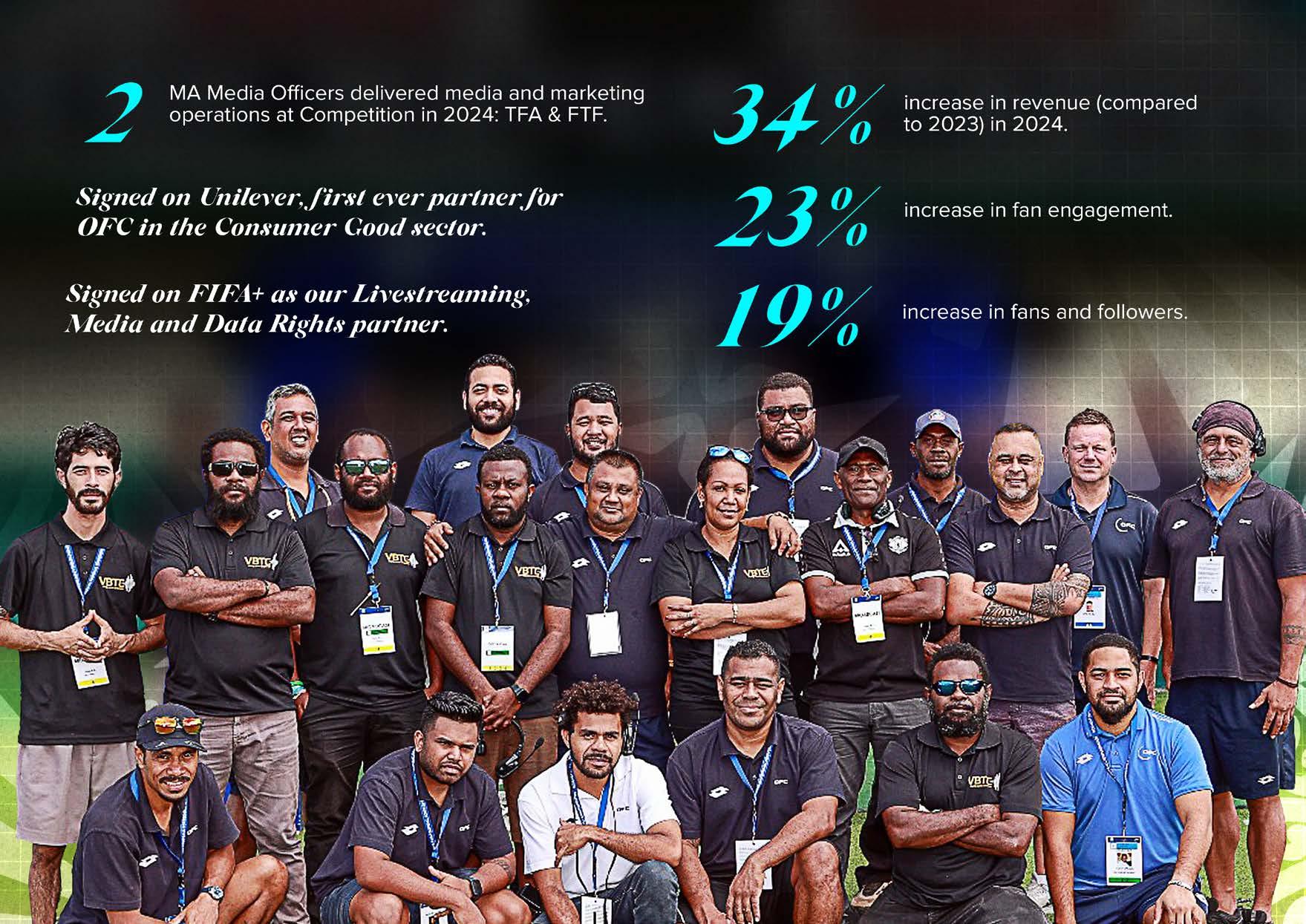
CROSS NETWORK IMPRESSIONS (Up 1%)
1.8MIL
YOUTUBE 1,898,404 MINUTES WATCHED (Up 89%)
2. LIVE (Up
2. GROWTH 2,689,986 (Up

LIVE STREAMING VIEWS 2,663,274 (Up 145%)
2. 6MIL GROWTH IN ENGAGEMENT
2,689,986 (Up 21%) 2. 6MIL
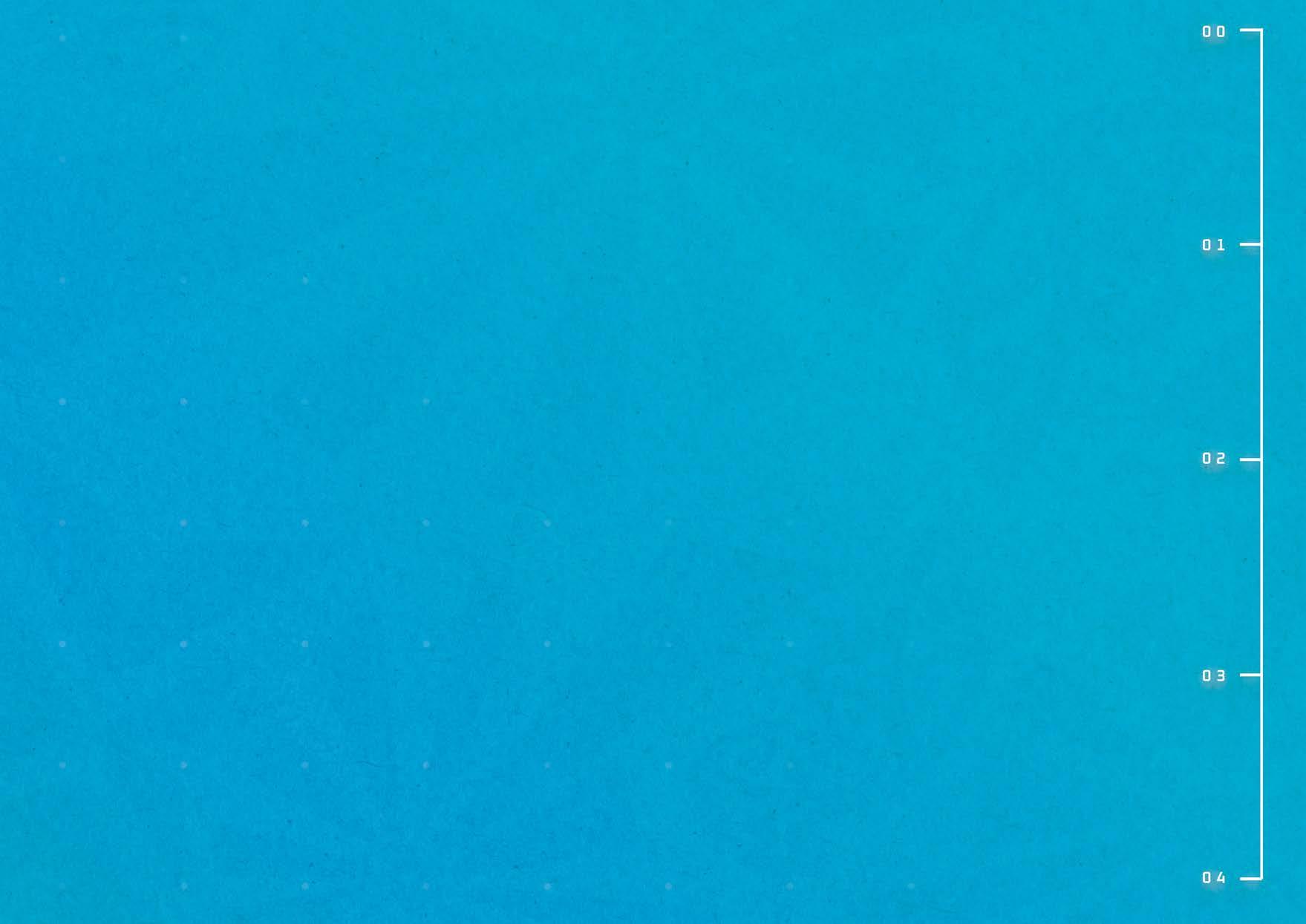
286K
GROWTH IN DIGITAL FOLLOWERS 286,398 (Up 20%)
363K
POST LINK CLICKS 363,772
The Finance and Services team delivered continued in 2024, to demonstrate unwavering commitment to financial integrity and operational excellence. The culmination of this effort was evident in the external audit, which presented a clean bill of health for the 2023 financial statements.
This accomplishment reinforces OFC’s commitment to transparency, accountability, and sound financial management and reflects the organisation’s dedication to maintaining transparency and compliance with international accounting standards.
The team seamlessly continued meeting the requirements for Statement of Services (SSP) reporting as mandated by the External Reporting Board (XRB). This achievement highlights OFC’s adaptability to evolving regulatory frameworks and strengthens stakeholder confidence in OFC’s operational and performance transparency.
OFC delivered an exceptional performance in the FIFA Central Review for 2023.
An innovative Financial Management Framework was developed and implemented, complete with detailed step-by-step guides to improve financial governance across Member Associations (MAs). The framework was successfully launched in the Solomon Islands and Cook Islands, marking a significant milestone in capacity-building and operational enhancement within MAs.
In 2024 significant improvements was introduced to the procurement platform, including a pending credit note and refund tracking system. This enhancement empowers OFC to proactively manage credits and refunds with suppliers, reducing financial waste and optimising spending efficiency.
A comprehensive framework was designed and implemented for hotel evaluation and preferred supplier approvals. The framework establishes clear criteria, negotiation steps, and approval processes, ensuring seamless accommodation arrangements for events and competitions. This initiative secured preferred hotels for all 2025 competitions.
By adhering to these stringent benchmarks, OFC continues to foster trust and accountability among its stakeholders, paving the way for sustained growth and development across the region.
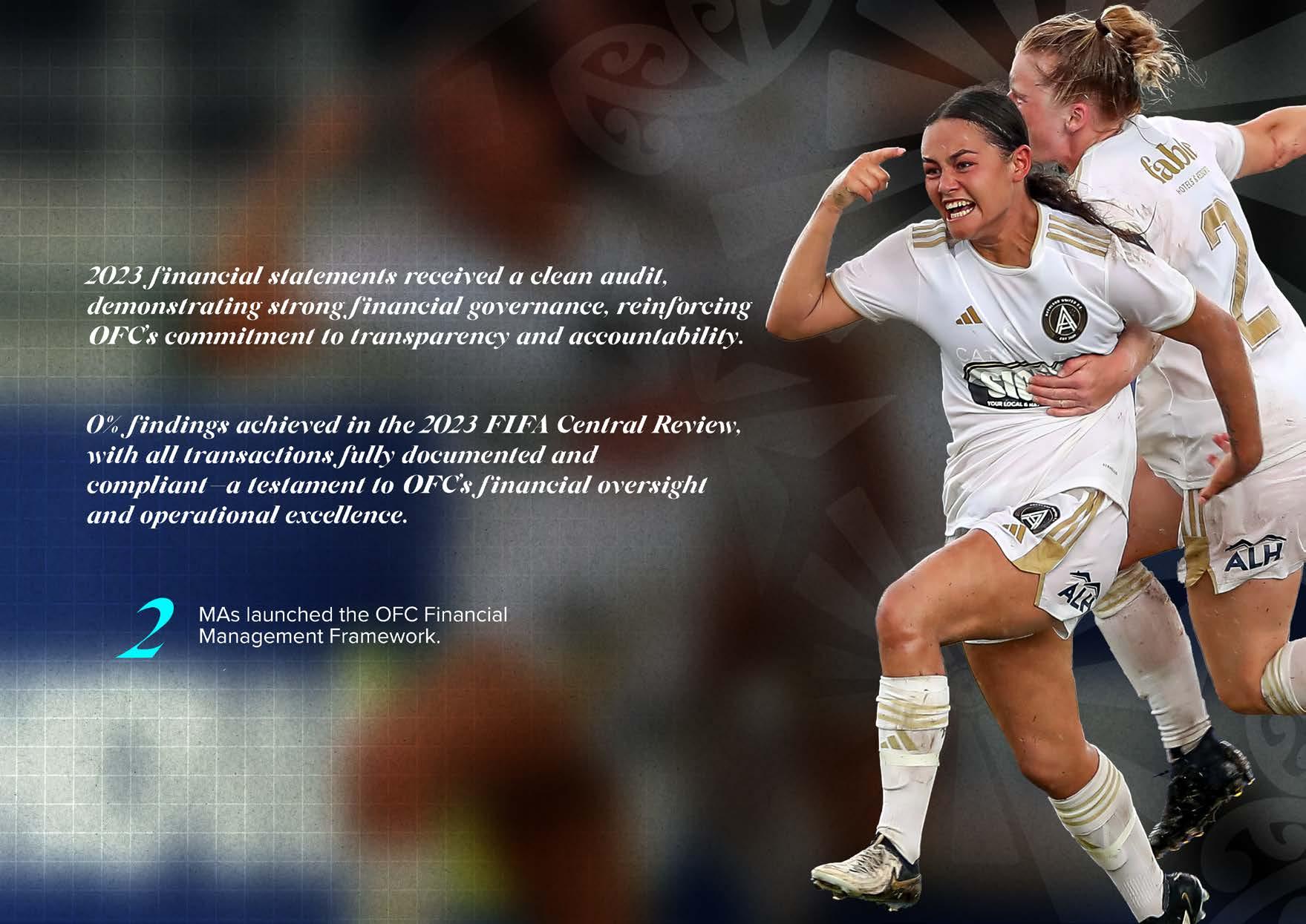

Good Governance
The OFC Professional League
In 2024, the Executive Office demonstrated its unwavering commitment to good governance, integrity, and collaboration through a series of high-impact initiatives and engagements.
The 30th OFC Ordinary Congress was successfully held in Bangkok, Thailand, coinciding with the 74th FIFA Congress where new independent members were elected by the OFC Congress to the OFC Judicial Bodies and Standing Committees. This milestone event underscored OFC’s dedication to high performance and good governance through transparent and independent decision making.
While in Bangkok, OFC signed a Memorandum of Understanding (MOU) with the French Football Federation (FFF), reflecting a shared vision for football development.
A key focus of the Legal and Compliance department was enhancing governance practices across our Member Associations (MAs) through a collaborative approach which addresses each Member Association’s unique needs.
Furthermore, OFC delivered a governance workshop to the Executive Committee of the Football Federation of Samoa (FFS) which covered how Member Associations can adopt good governance practices across the Federation. The content included the importance of understanding roles and responsibilities between the Executive Committee and the General Secretariat whilst working collectively together to achieve their purpose.
As part of the OFC Executive Programme, the Legal and Compliance Department delivered a comprehensive governance webinar to Member Association General Secretaries. Led by and supported by OFC General Secretary and
Chief Operating, the session covered principles of good governance, roles and responsibilities of Executive Committees and General Secretariats (GS), and strategies for fostering mutual trust between Boards and Secretariats. Continuing OFC’s commitment to elevate governance practices within the region, the webinar provided Member Associations GS’ the opportunity to discuss their own experiences, raise questions and hear from the personal experiences of Mr Castillo and Mr Guillemont.
With the finalisation of the OFC Match Integrity modules on OFC Learn, enhancing OFC’s integrity approach was a forefront for OFC in 2024. Representatives of OFC Member Associations attended the inaugural FIFA Integrity Summit held in Singapore in April, joining Integrity Officers from 211 Member Associations. This summit provided a platform to address integrity-related challenges across sports and introduced the new FIFA Integrity Handbook. The event emphasised FIFA’s structured pathway for supporting Member Associations and Confederations in safeguarding football integrity.
Subsequent to the Summit, the FIFA Integrity team launched the second edition of the FIFA Global Integrity programme offering tailored training to Member Associations based on their specific needs. This programme includes specific collaboration with OFC Legal and Compliance to ensure the programme’s content aligns with the unique realities of the Oceania region.
The Executive Office’s efforts in 2024 laid a solid foundation for continued progress in governance and integrity. Through strategic partnerships, innovative training programmes, and a steadfast focus on good governance, OFC is poised to build on its successes in the years to come.

It was a dynamic year for the OFC Professional League as significant strides were made in 2024 in preparation for its official launch in January 2026. Since the OFC Executive Committee approved the league’s formation, plans have progressed toward full implementation involving multiple stakeholders. Strong collaboration with OFC Member Associations (MAs) will ensure a seamless transition to professional football, with structural frameworks, governance models, and regulatory policies in the works to support the league’s integrity and competitiveness.
One of the developments was the decision to welcome expressions of interest from Australian clubs. In partnership with Football Australia and the Australian Government, the OFC extended an invitation to Australian-based clubs to participate, aiming to strengthen ties within Pacific communities and enhance the overall standard of competition. This initiative has generated enthusiasm, with discussions continuing to define the potential impact of cross-border participation.
The OFC Professional League Club Licensing Regulations were approved in September 2024. Coupled with the migration of the Club Licensing core process onto the OFC COMET system, any Member Association that wishes to administer their club licensing system, can now do that through comet, and no longer manually, a significant milestone for OFC. Support will be offered to member associations to ensure that they can implement this effectively.
The OFC Professional League also gained international recognition through its presentation at the World Football Summit in Riyadh. This platform showcased the league’s vision of transforming football in the Pacific by providing professional opportunities for players and clubs, creating a more sustainable and competitive football environment. By sharing its progress on a global stage, the OFC reinforced its commitment to developing football at all levels while fostering potential partnerships that will further elevate the league’s profile.
Leadership appointments have played a crucial role in driving the league’s progress, with Stuart Larman, a seasoned football administrator with experience at FIFA and the Asian Football Confederation (AFC), taking on the role of Project Manager. His expertise in league development and football operations has been instrumental in shaping the strategic direction of the project, ensuring that all foundational elements align with international best practices.
Infrastructure and financial planning remain key priorities, with extensive evaluations of stadium facilities across the region to meet professional standards. Business models have been refined to ensure long-term league stability, while discussions with potential investors and sponsors continue to shape the commercial framework that will underpin the league’s success. A comprehensive commercial strategy will be finalized in 2025, with object to maximise revenue, viewership and engagement across Oceania and globally, with preliminary talks underway with media partners to enhance coverage.
Stakeholder engagement has been an essential component of 2024, with continuous dialogue between OFC, Member Associations and clubs, to align goals and expectations.
As the league approaches its 2026 launch, the next phase in 2025 will focus on finalising club participation, strengthening licensing and compliance measures, and securing commercial partnerships. With branding, sponsorship deals, and broadcasting agreements expected to take shape, the OFC Professional League is entering a crucial stage of its development. The progress made in 2024 has set the foundation for an exciting new era in Oceania football, and with continued strategic execution, the league is well-positioned for a successful and impactful debut in 2026.

FIFA’s presence in the region is primarily represented by the FIFA Regional Development Office, which serves as the principal liaison between FIFA and its member associations. The office plays a critical role in facilitating the implementation of the FIFA Forward Development Programme at both regional and local levels. Its core functions include coordinating and supporting FIFA-related activities, promoting knowledge-sharing and educational initiatives, and providing strategic and operational guidance to enhance football development. Additionally, the office gathers and analyses essential information to enable FIFA to tailor its support and development strategies effectively.
In addition to the Regional Development Office, FIFA has appointed key consultants in the region to oversee and implement various strategic programmes such as the implementation of FIFA’s Global Football Development initiatives in Oceania. Their primary mandate is to professionalise football by providing tailored assistance to stakeholders through strategic development initiatives, with a strong emphasis on training and education within member associations.
FIFA President Gianni Infantino has been a strong advocate for expanding football competitions as a means to enhance the sport’s global reach and inclusivity. His vision of making football “truly global” has driven significant changes. The expansion of the FIFA World Cup and increased entries in FIFA youth tournaments have strengthened national teams’ participation in regional qualifiers. Given Oceania’s geographical remoteness and the high costs of travel, FIFA Forward funding has been essential in facilitating increased participation at international competitions. Papua New Guinea, New Zealand and Vanuatu participated in the 2024 FIFA Series. Efforts are also focused on enhancing domestic competitions to address logistical challenges while improving technical and developmental aspects. In addition to FIFA Forward operational and solidarity contributions, a further USD 4.2 million has been committed by member associations in 2024 alone to support both domestic programmes and international participation.
Sports infrastructure is fundamental to development, providing the essential foundation for athlete training, competition, and effective football administration. The FIFA Forward Programme has prioritised infrastructure investment, with USD 21 million allocated since 2016—the largest regional investment to date. Facilities are designed to meet the specific football needs of member associations while addressing the region’s unique environmental challenges. The newly completed Apia Park Football Complex enhances Football Federation Samoa’s capacity, offering high-quality football-specific facilities, offices, and workshop spaces in a central location. It also complements existing headquarters at Tuanaimato, supporting community engagement and corporate social responsibility initiatives. (image)
As part of the FIFA-Pacific Islands Forum (PIF) Memorandum of Understanding (MOU), Port Moresby, Papua New Guinea, hosted the FIFA Infrastructure & Facilities Maintenance Workshop on 9-10 April 2024. The workshop aimed to equip member associations with a long-term, strategic approach to football infrastructure development, emphasising tailored maintenance plans that ensure facilities are compliant, sustainable, inclusive, accessible, and aligned with safeguarding principles.
A robust financial governance framework ensures prudent resource management, enhances transparency, and fosters long-term sustainability, enabling strategic investment and safeguarding football’s growth and integrity. FIFA Consultant Hugh McAlister was engaged in 2024 to provide support to member associations. His mandate was to ensure readiness for the FIFA Central Audit Review through the implementation of action plans from previous audits. In addition to evaluating and enhancing financial structures and internal controls within the member association.
The FIFA Football for Schools Programme, in collaboration with UNESCO, integrates football into education to equip children with essential life skills. Targeting 700 million youth globally, it promotes accessibility for both boys and girls while aligning with the UN Sustainable Development Goals (SDGs). In 2024, the initiative expanded further with successful implementations in the Solomon Islands, Fiji and Papua New Guinea, extending its reach to five member associations across the Pacific.
FIFA’s Global Football Development Division implements several key programmes to advance football worldwide.
Nine member associations were approved for the Talent Development Scheme (TDS) in 2024 with the Cook Islands, Samoa and Tonga applying for the first time for additional funding. Linked to TDS, Tahiti, Vanuatu and Solomon Islands now have a talent Coach with Fiji soon to follow. The Talent Coach programme in New Caledonia is set to resume once the civil unrest eases.
The Amateur Football Environment Analysis (AFEA) seeks to gain a comprehensive understanding of amateur football of FIFA member associations, evaluating both on- and off-field factors that contribute to overall effectiveness. By benchmarking these areas against global standards, the AFEA identifies key opportunities for improvement and provides a structured set of recommendations to enhance performance and development. Work on the Amateur Football Ecosystem Analysis continued in 2024 with almost all member associations completed.
The Cook Islands Technical Director attended to FIFA Technical Leadership Introductory Workshop. The Technical Directors of Fiji FA and New Zealand Football are currently involved in FIFA Technical Leadership Programme which aims to provide professional recognition for technical leadership roles, serving as the industry benchmark for recruiting and retaining football leaders while equipping participants to become influential and effective decision-makers.
In 2024, FIFA revised its global Women’s Football Strategy to accelerate the sport’s rapid growth and set a new benchmark for its development. This renewed commitment underscores FIFA’s dedication to fostering the sustainable advancement of women’s football by strategically enhancing global participation, strengthening commercial viability, and establishing a robust structural foundation to support its long-term expansion.
Women’s football development officers and social responsibility managers from every Oceania Football Confederation member association assembled in Wellington where FIFA chief Dame Sarai Bareman emphasised the integration of the women’s strategy in FIFA’s overall strategy, and the need for the women’s game to be prioritised and integrated throughout member associations.
Several Women’s Football Experts continued to be engaged in 2024 to support member associations on several key initiatives available under the Women’s Football Strategy. Stephanie Spielmann is actively assisting Tahiti and Tonga with the Women’s Football Campaign, League Development, and Capacity Building for Administrators, while also supporting Vanuatu in the development of their Women’s Football Strategy. Sue Ronan lends her expertise to New Zealand Football, collaborating closely with Kelly Cross in the evaluation of TDS applications. Additionally, Simon Toselli, previously engaged as a FIFA and OFC Coach-Mentor in Oceania, is supporting Fiji, New Caledonia, and the Cook Islands in areas such as Club Licensing, League Development, and Women’s Football Strategy.
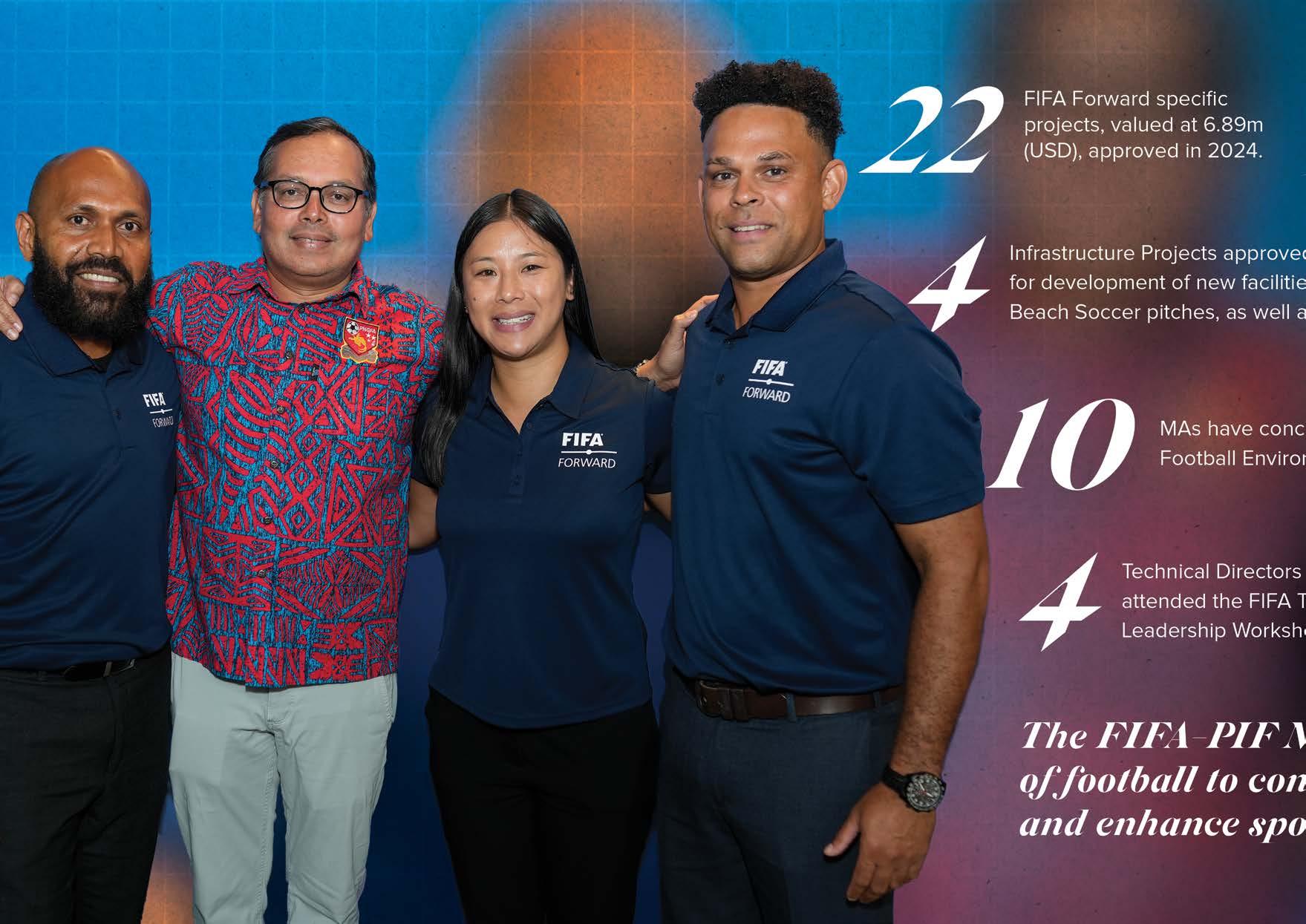
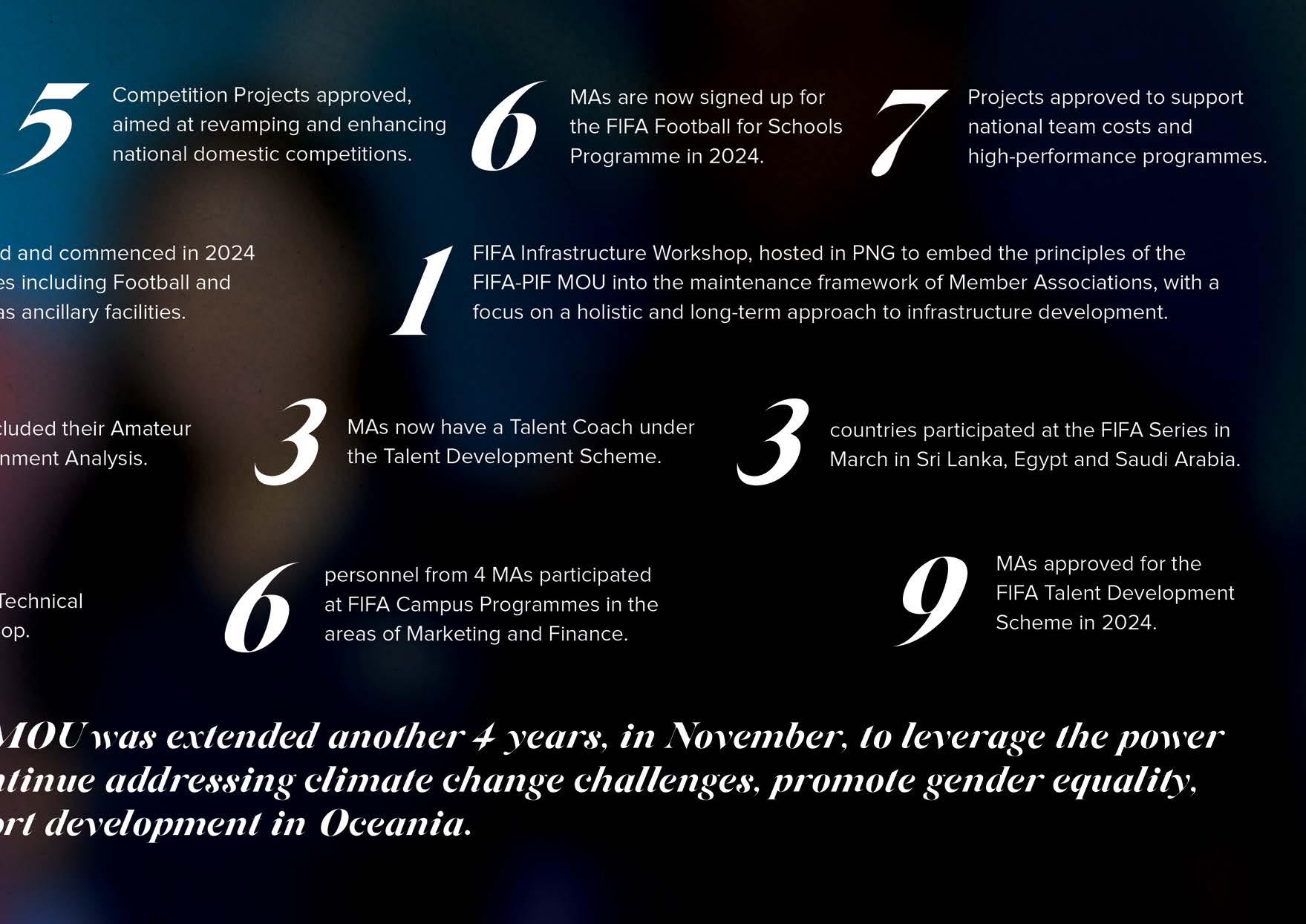
THANK YOU

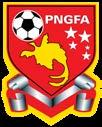

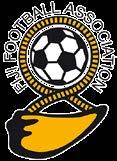
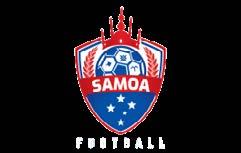

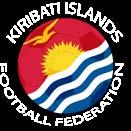
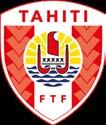

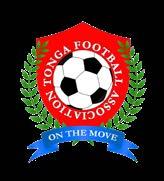
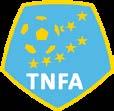


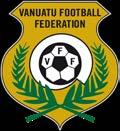
Thank you for all your support in 2024





